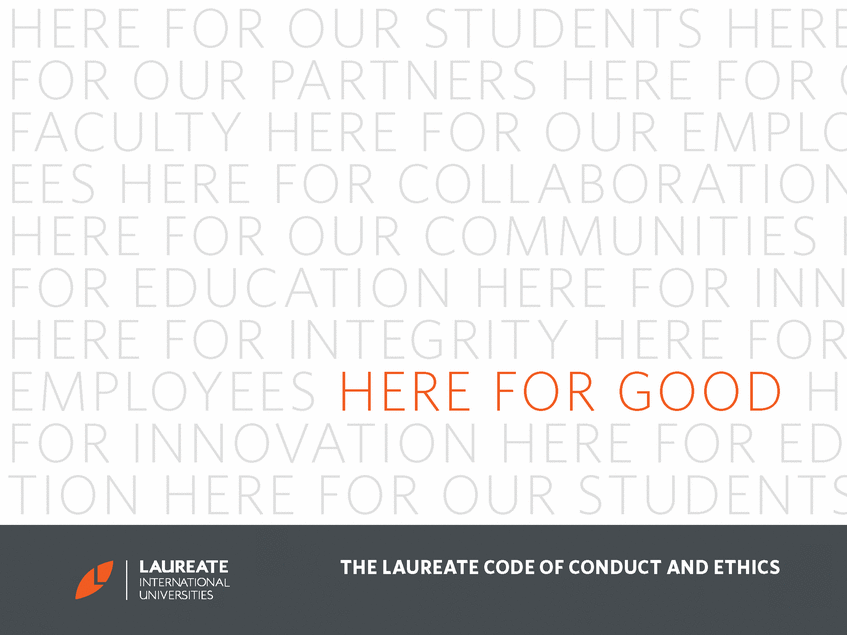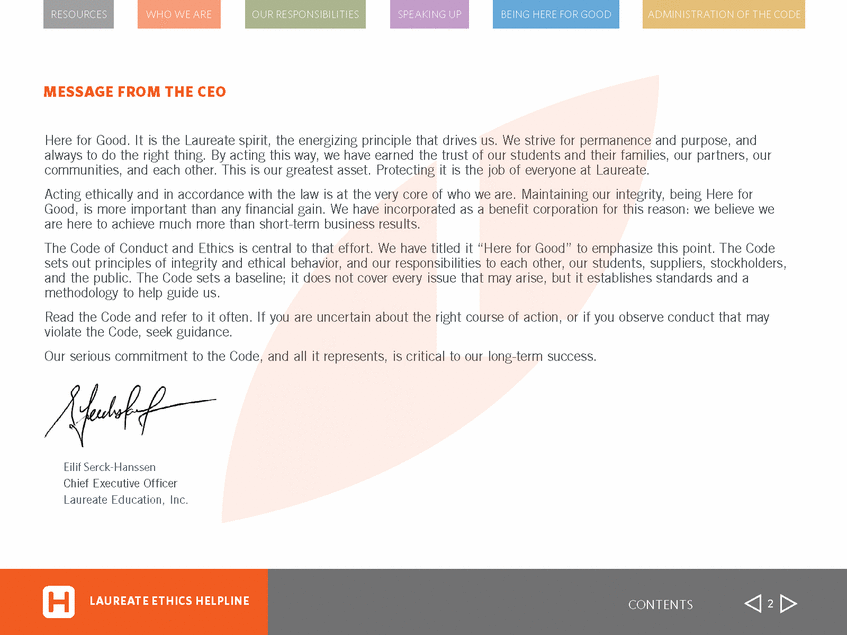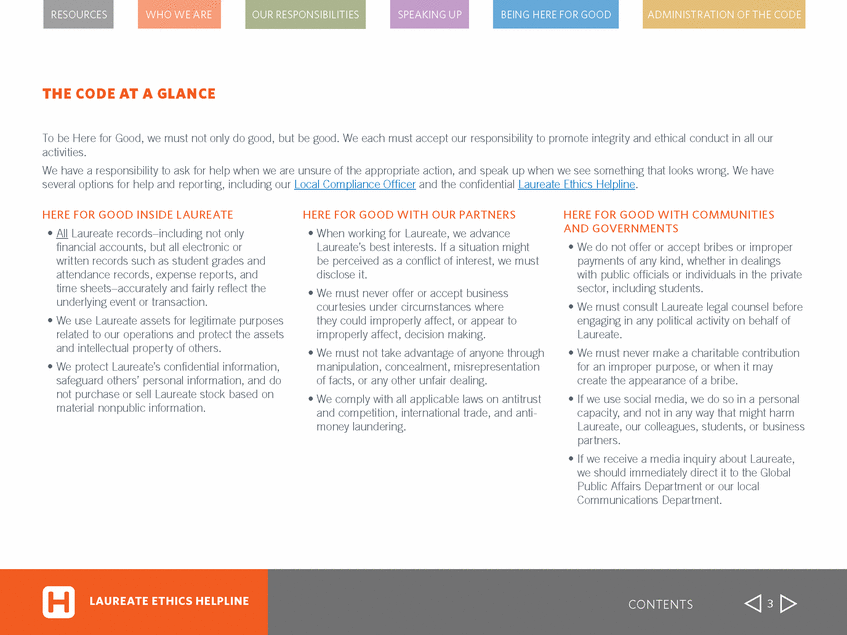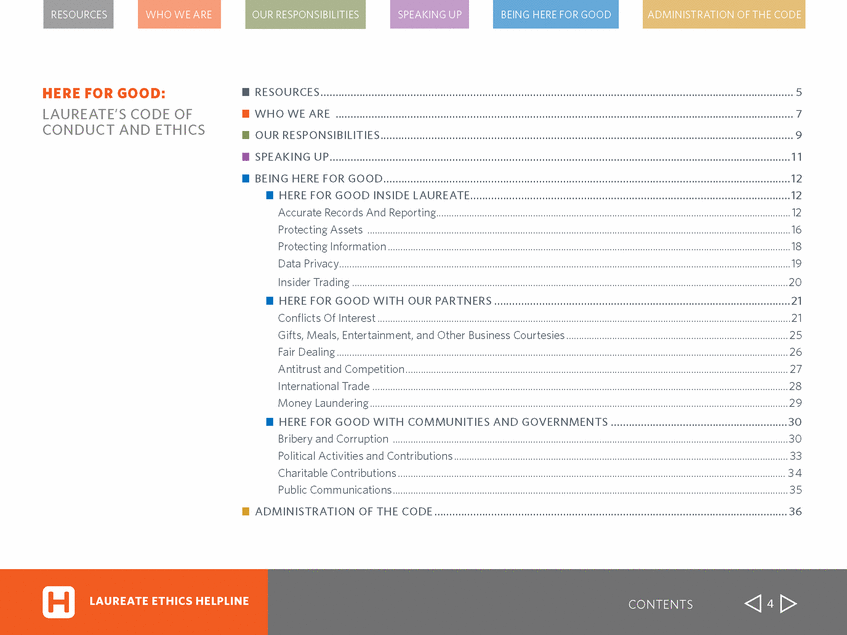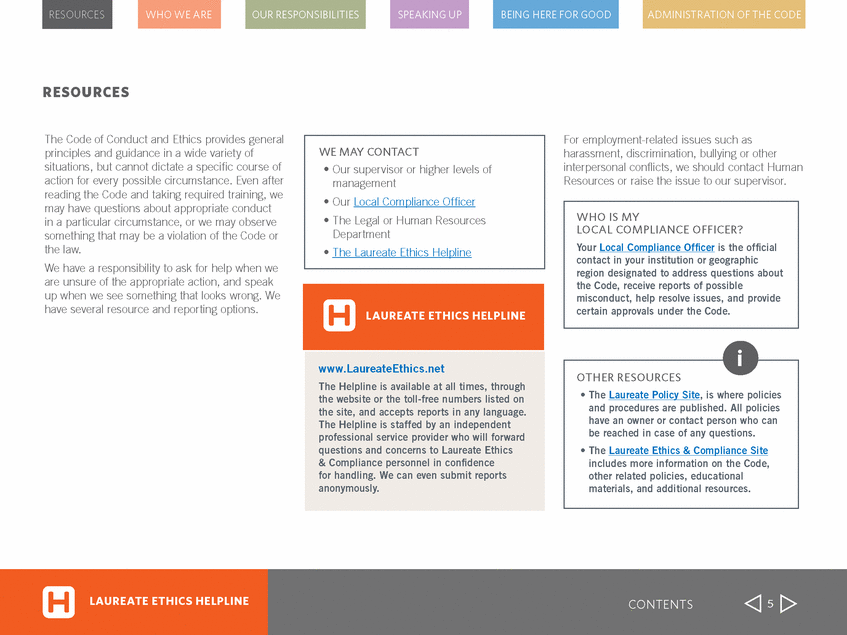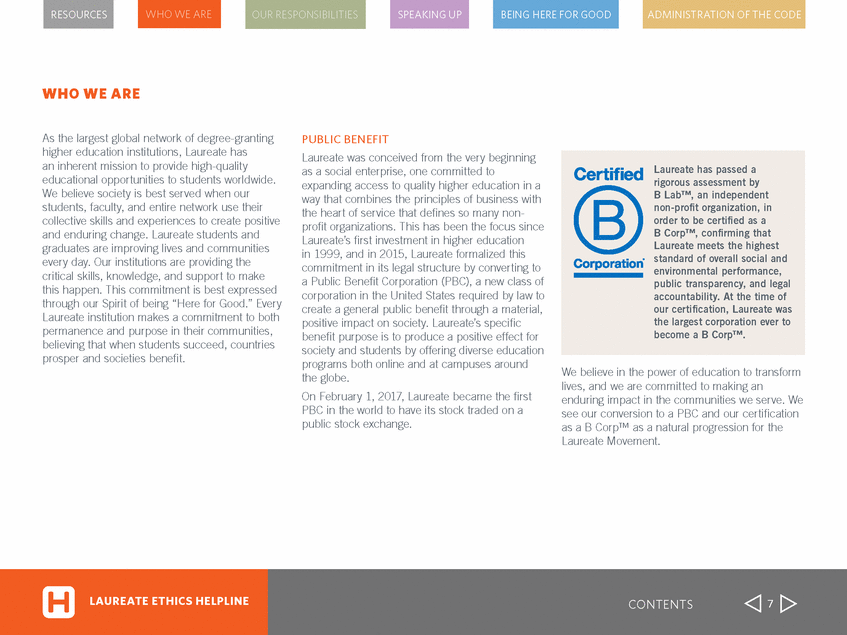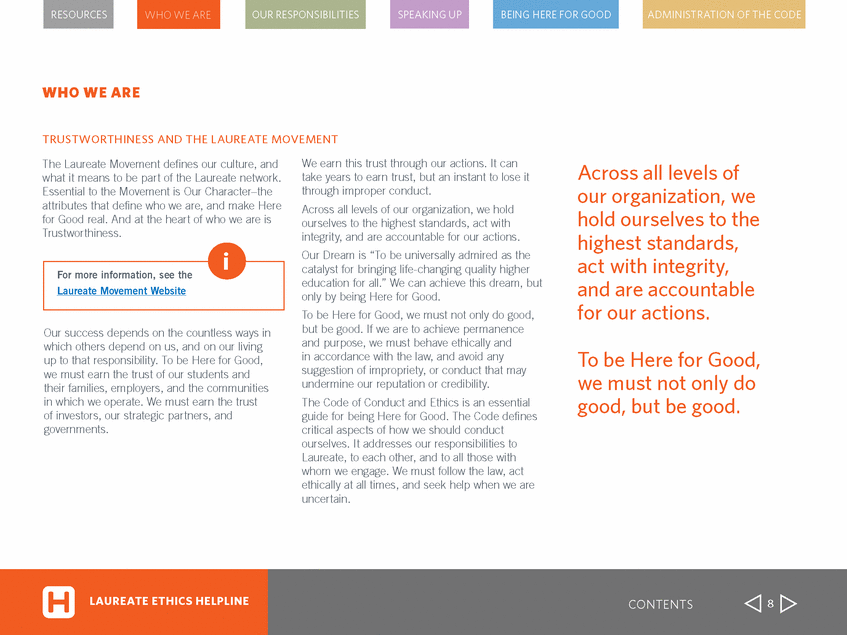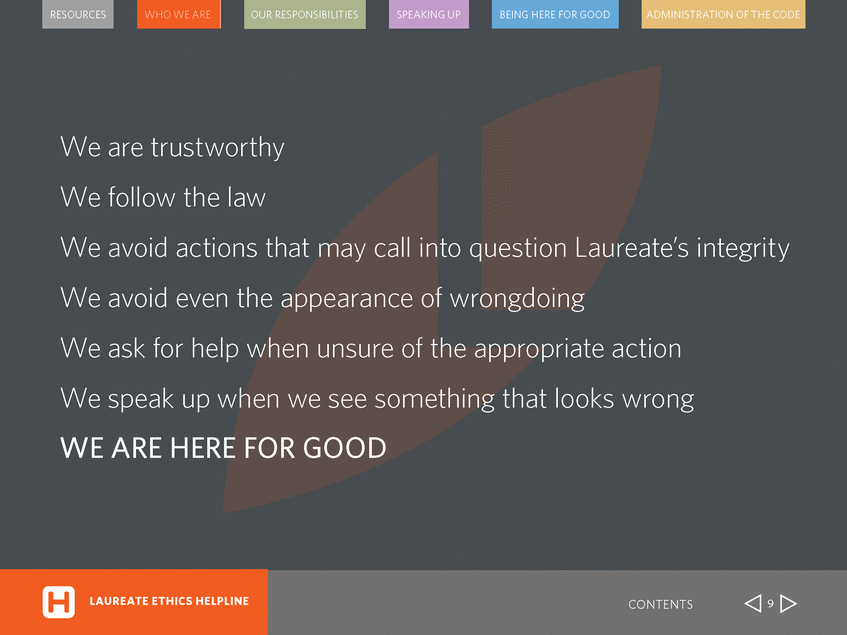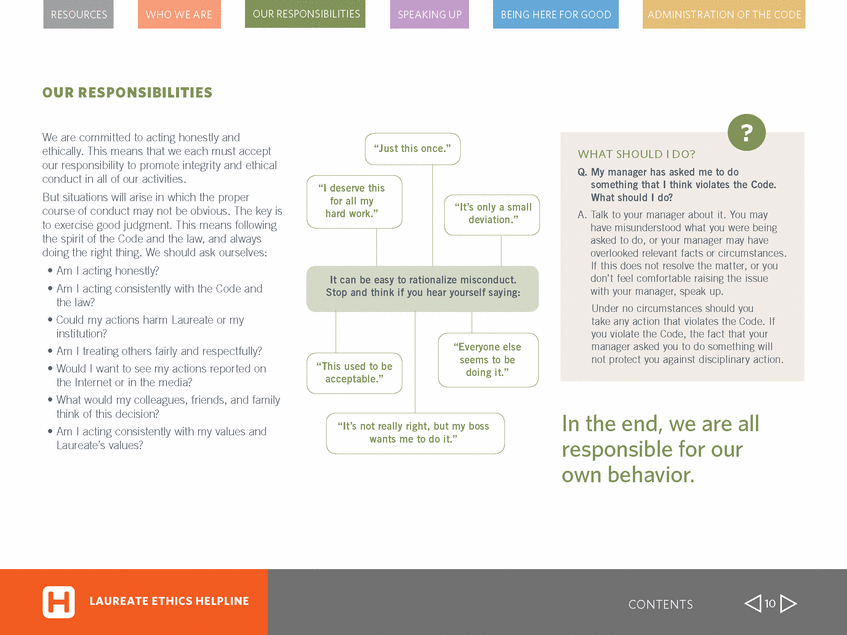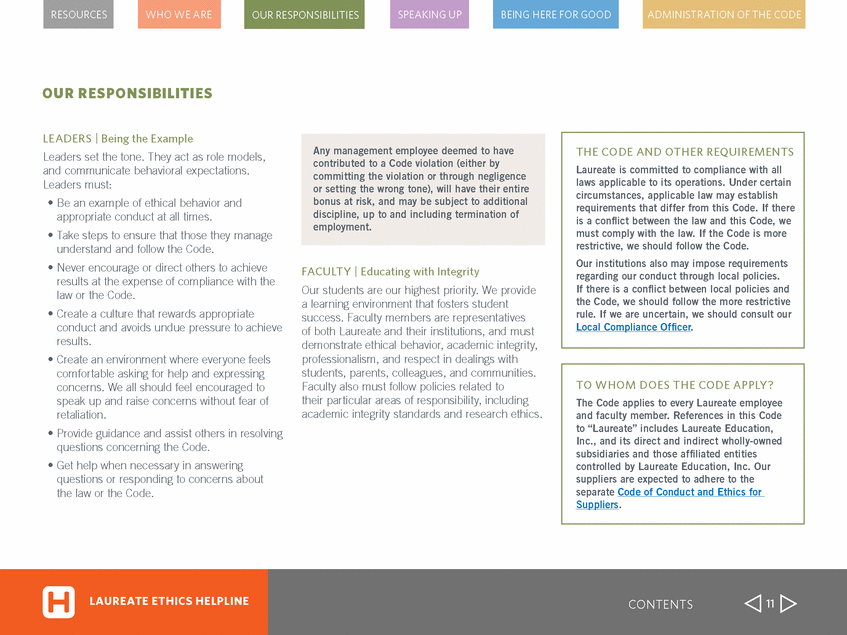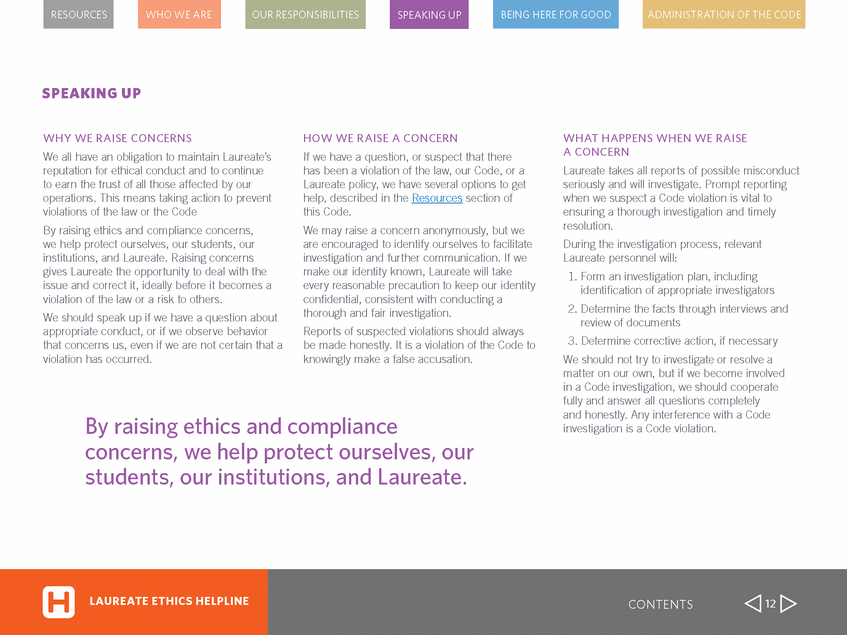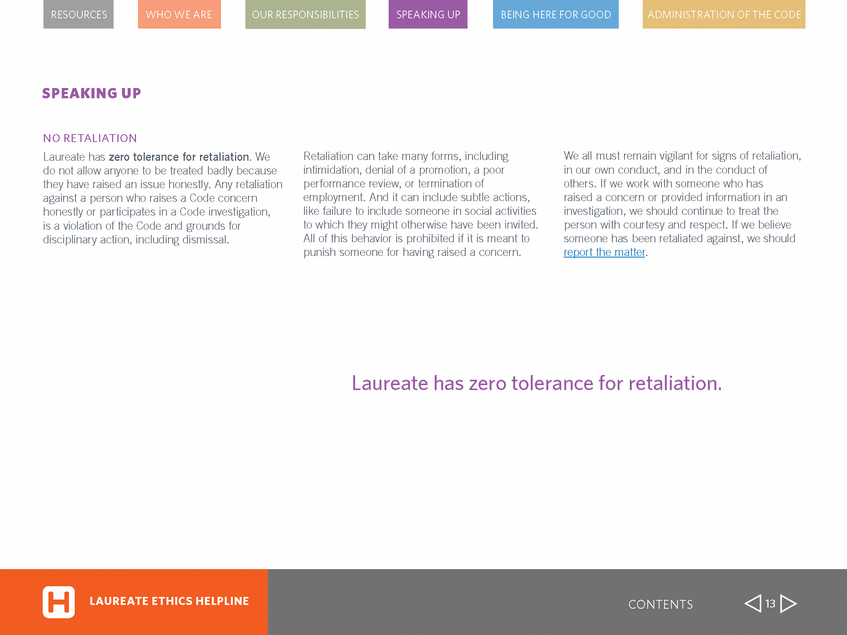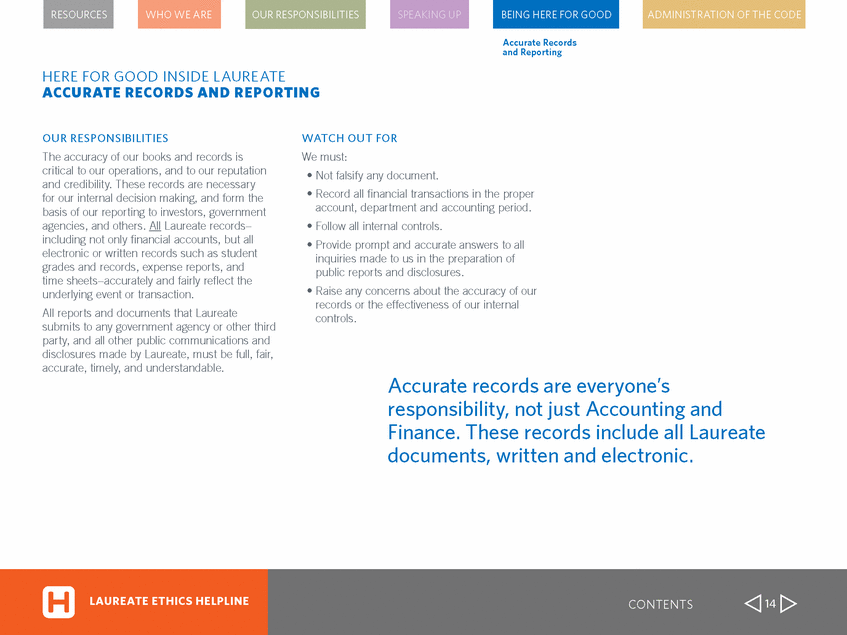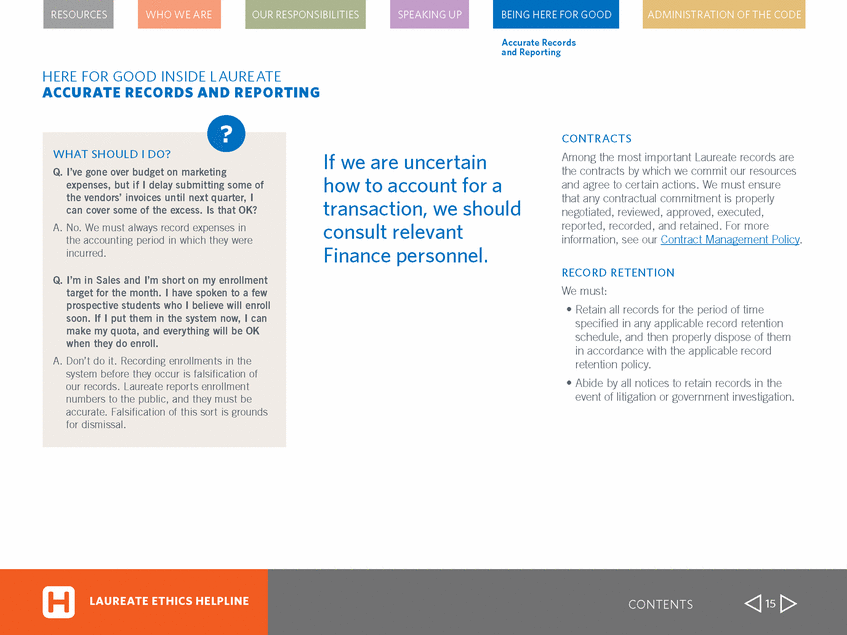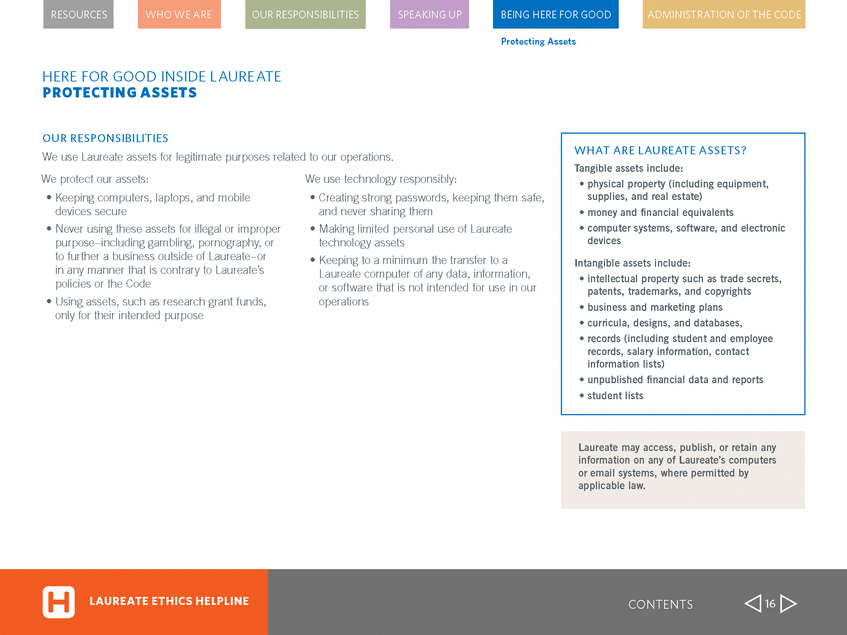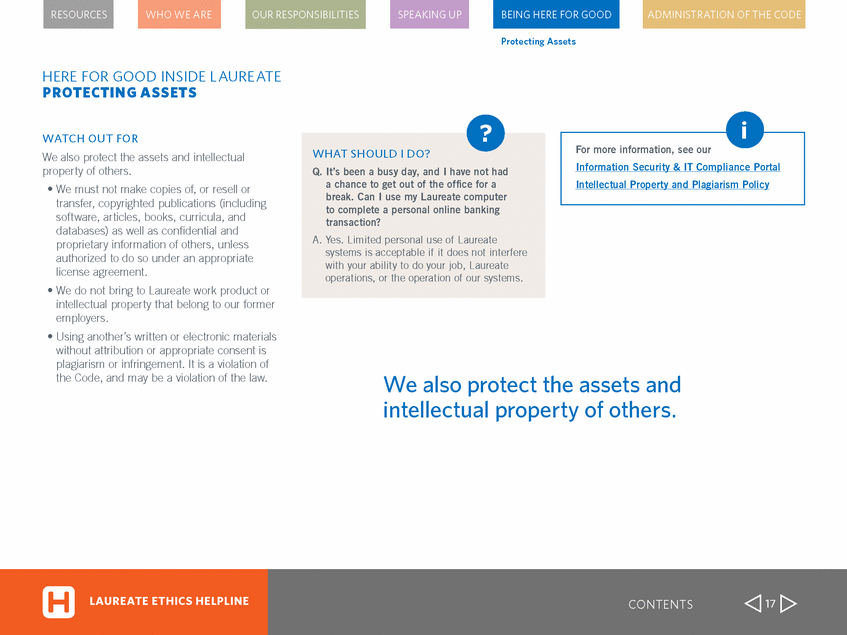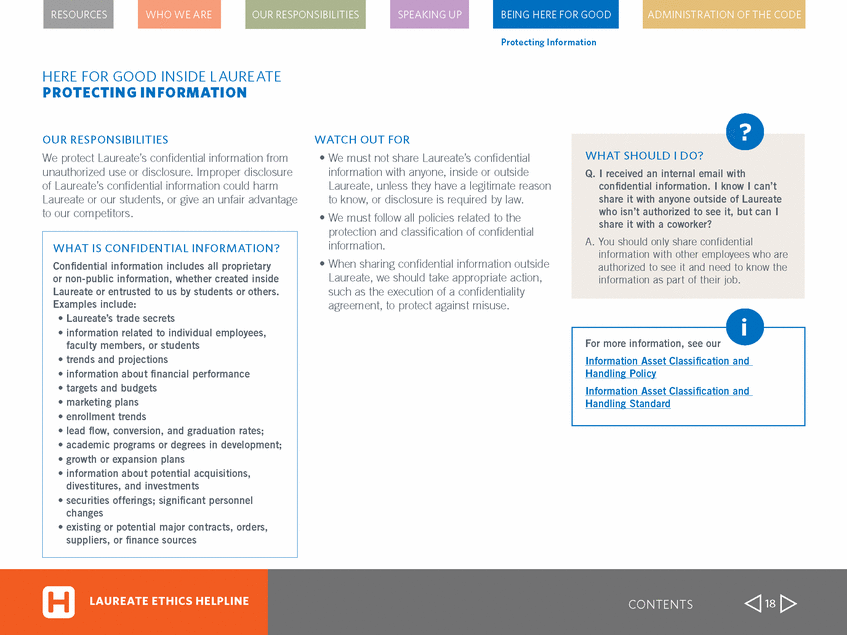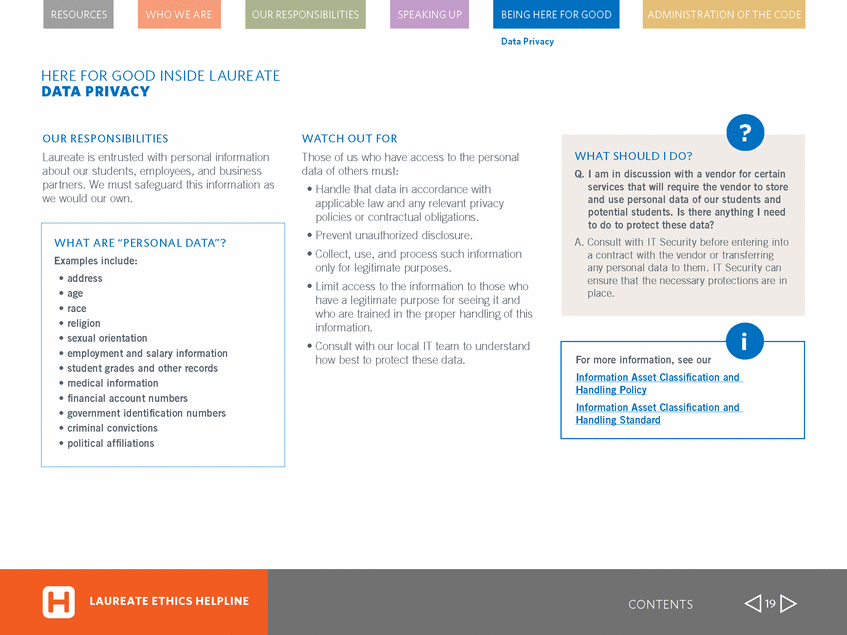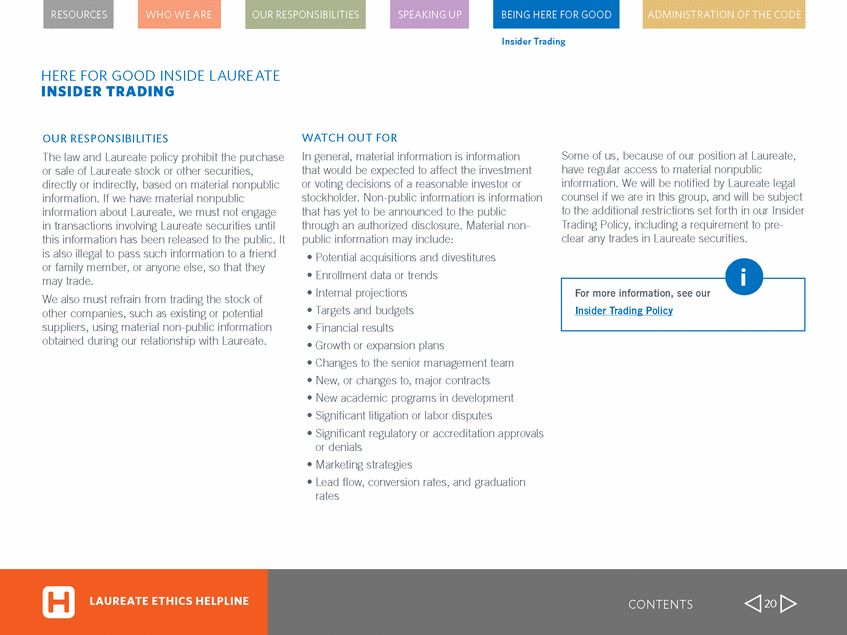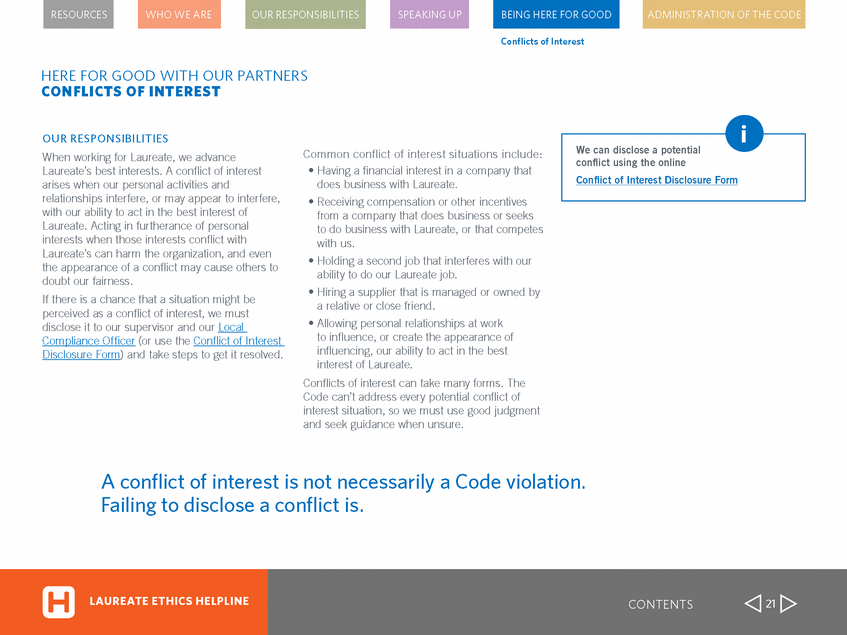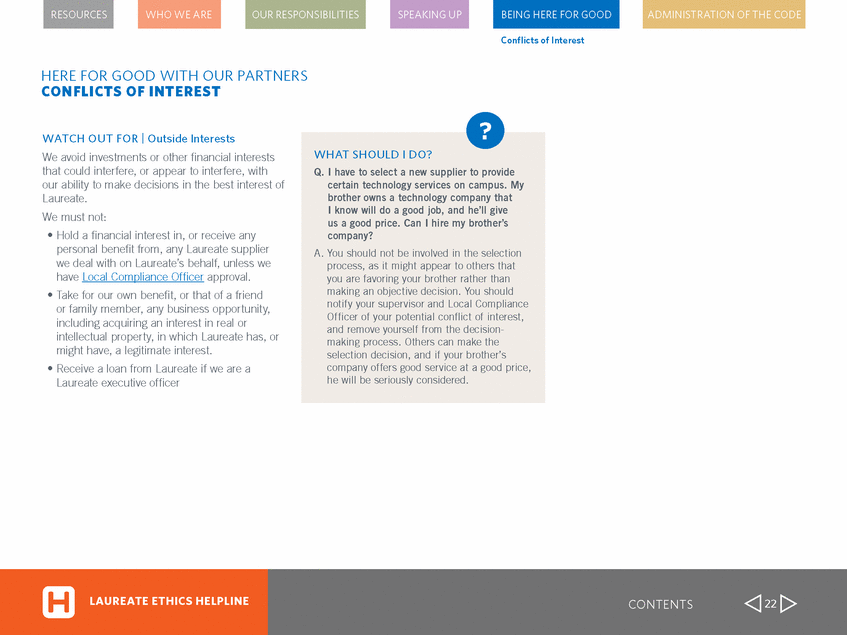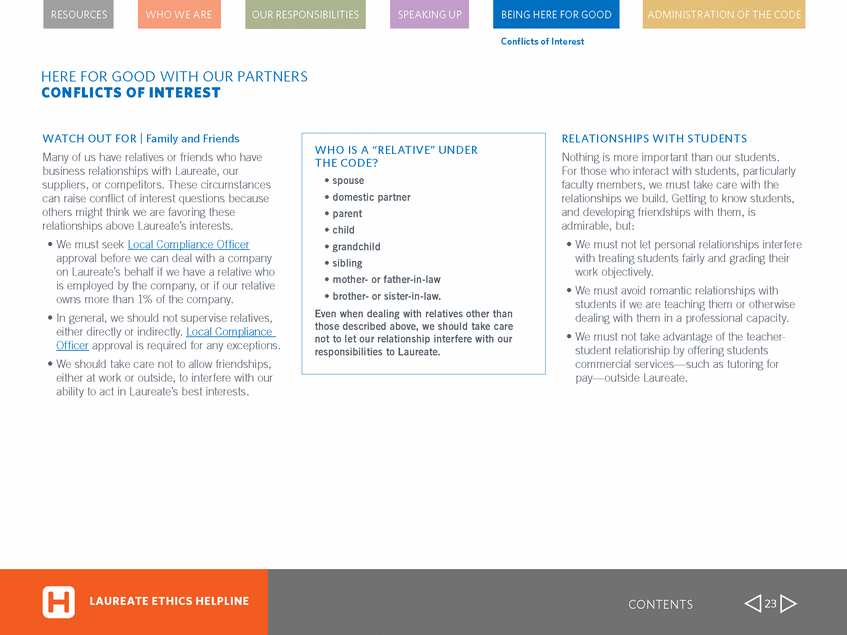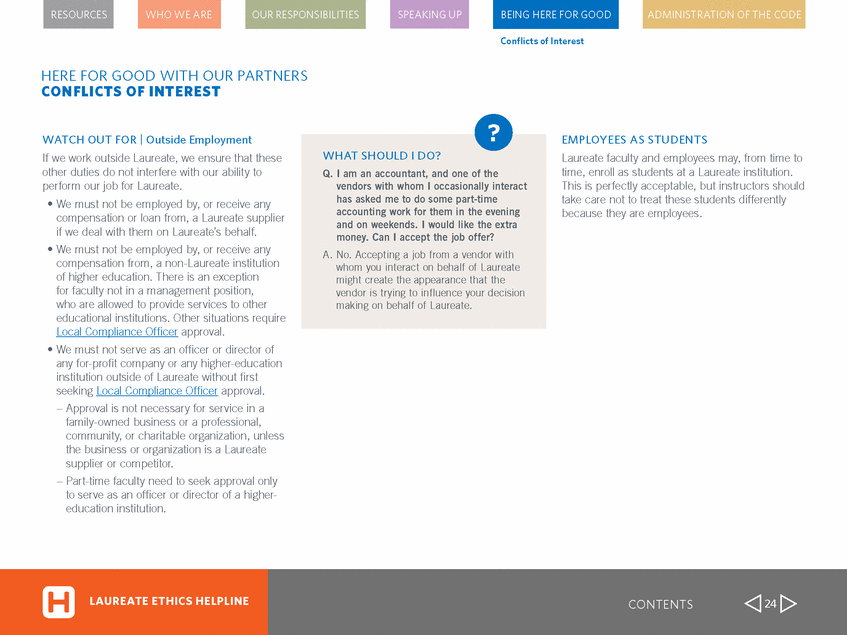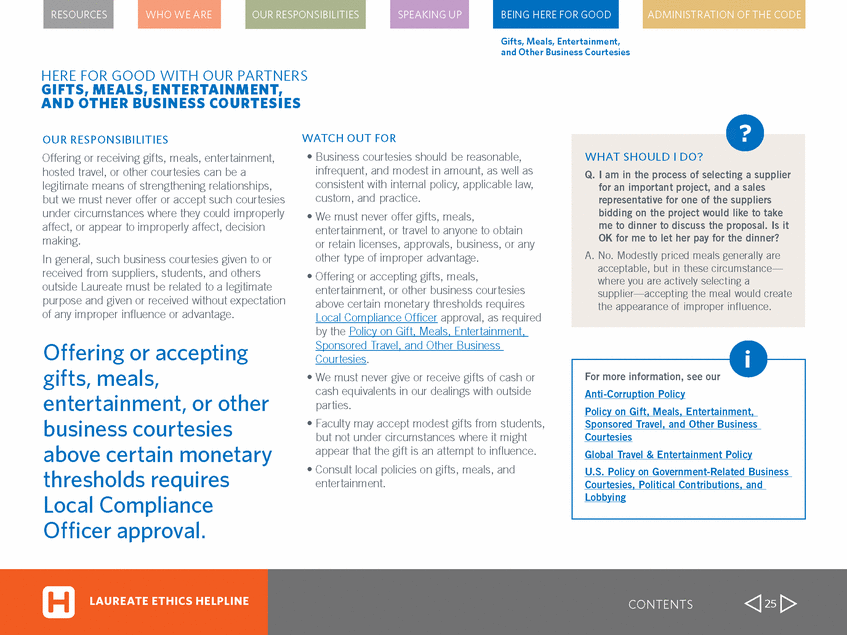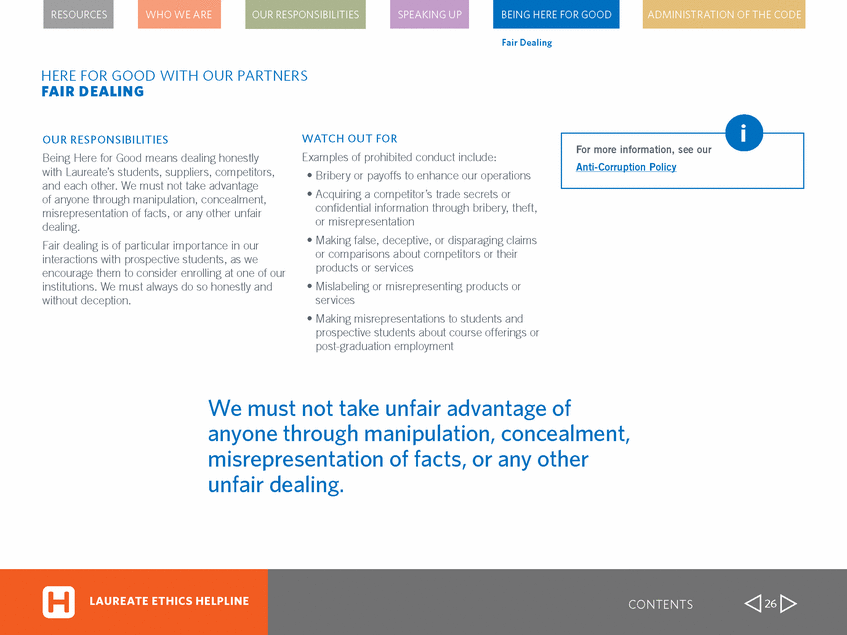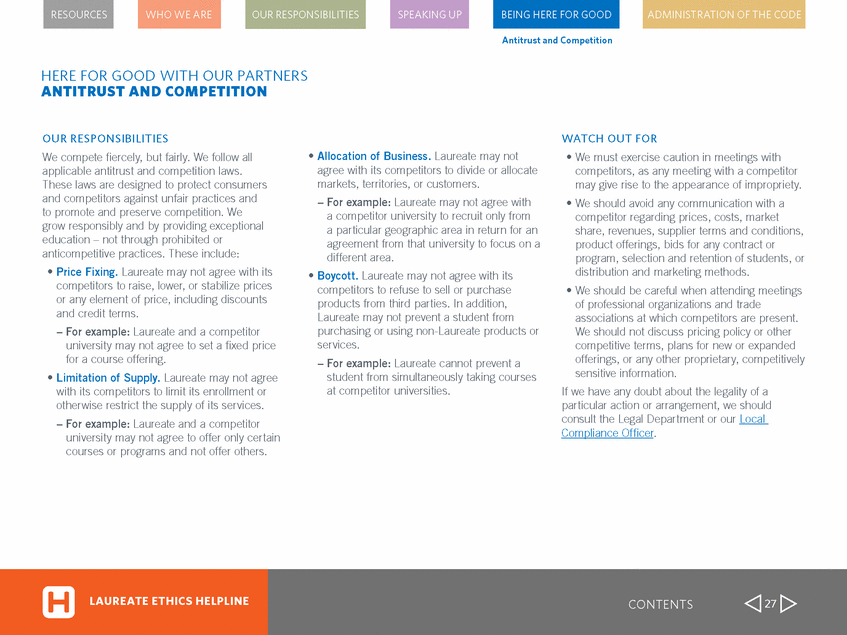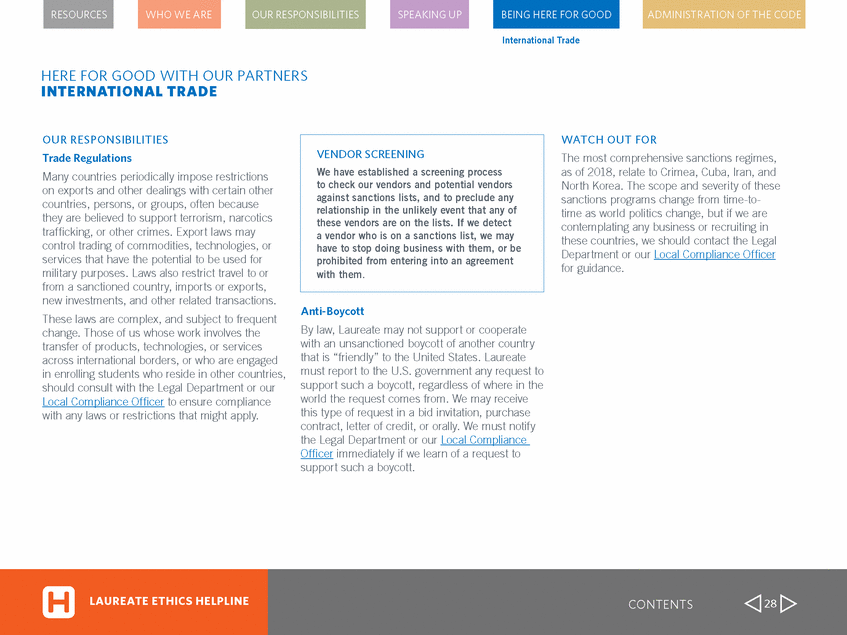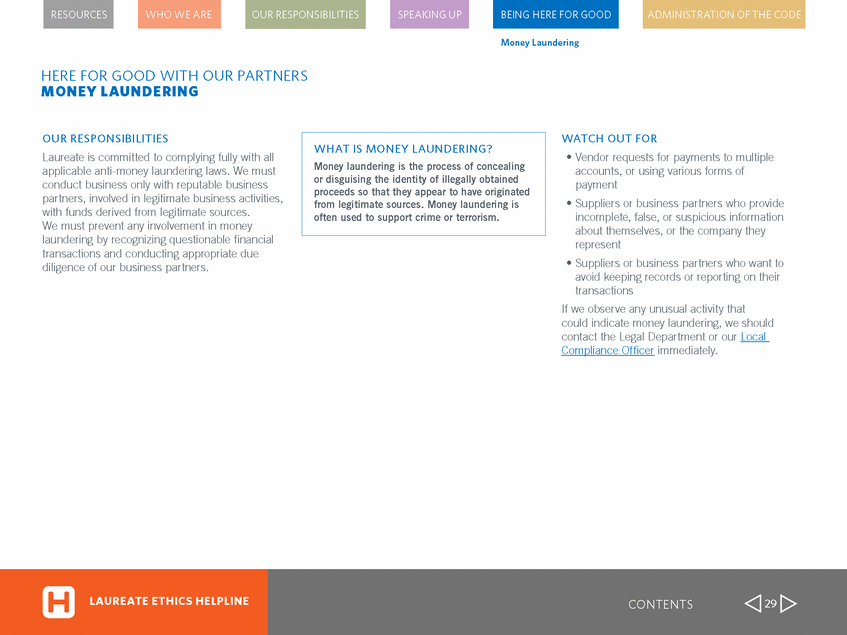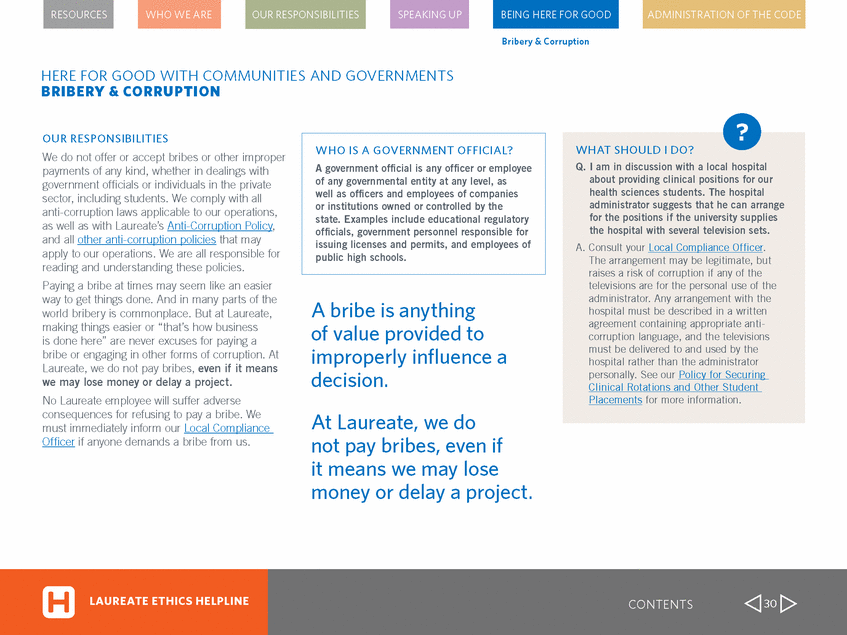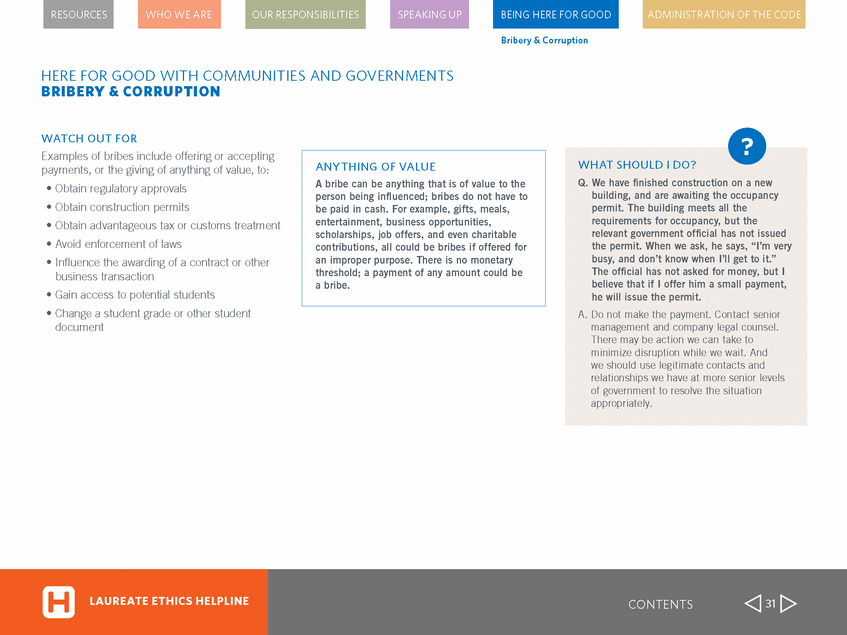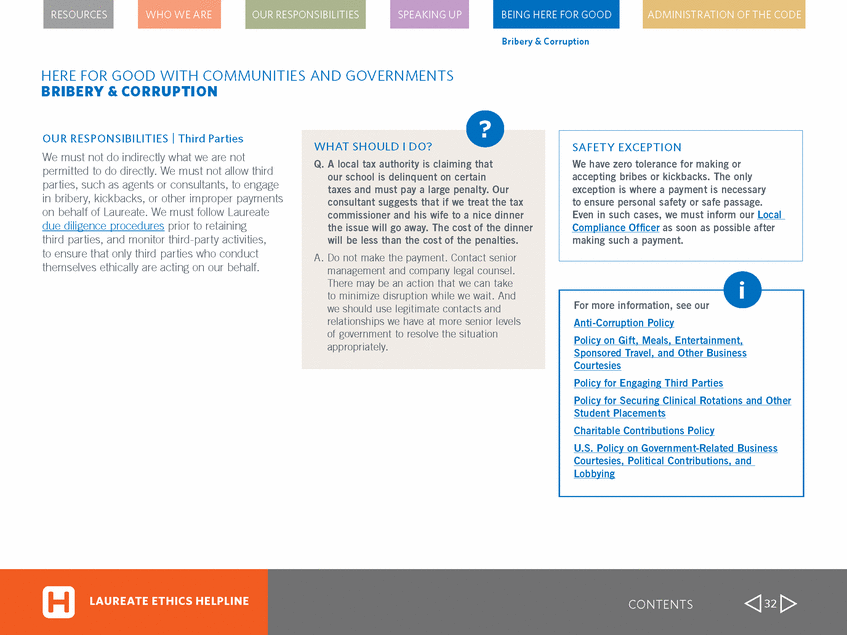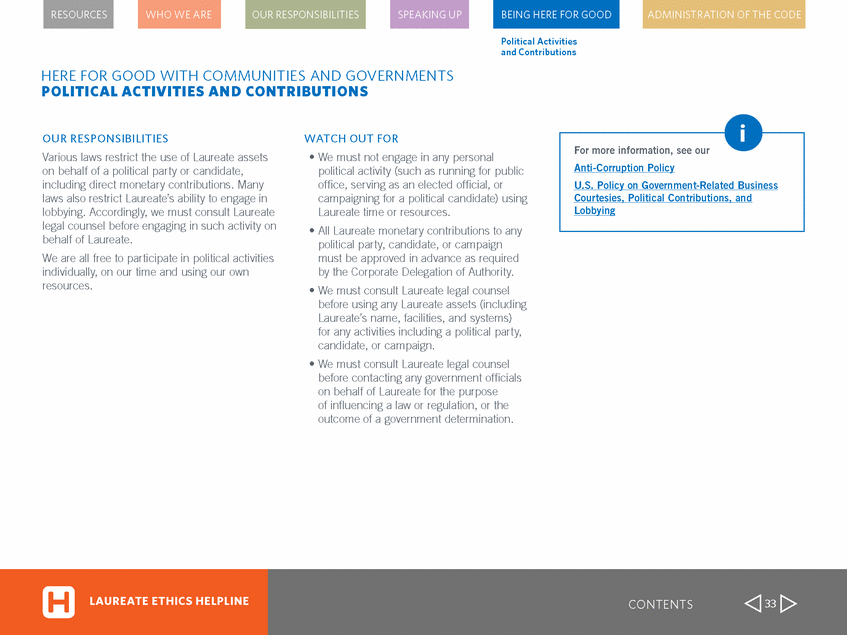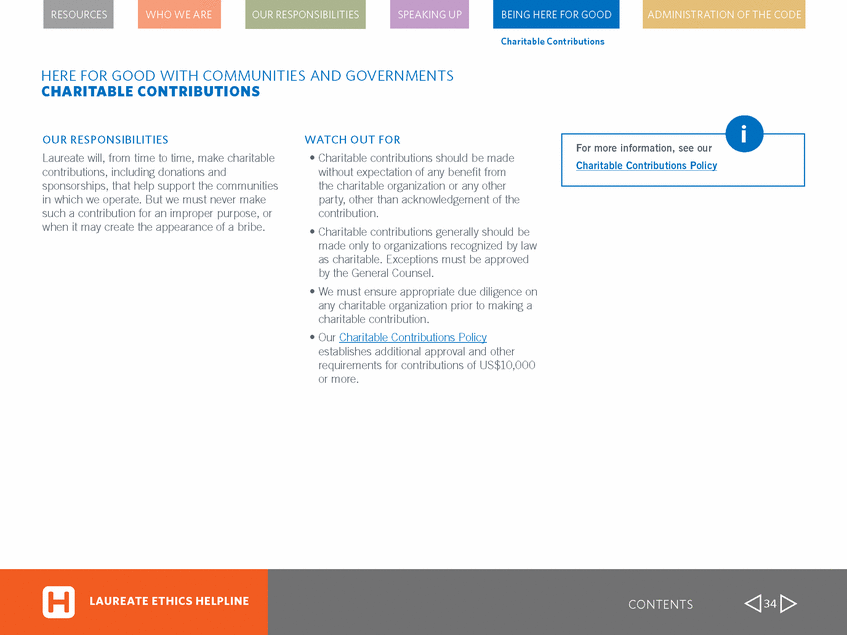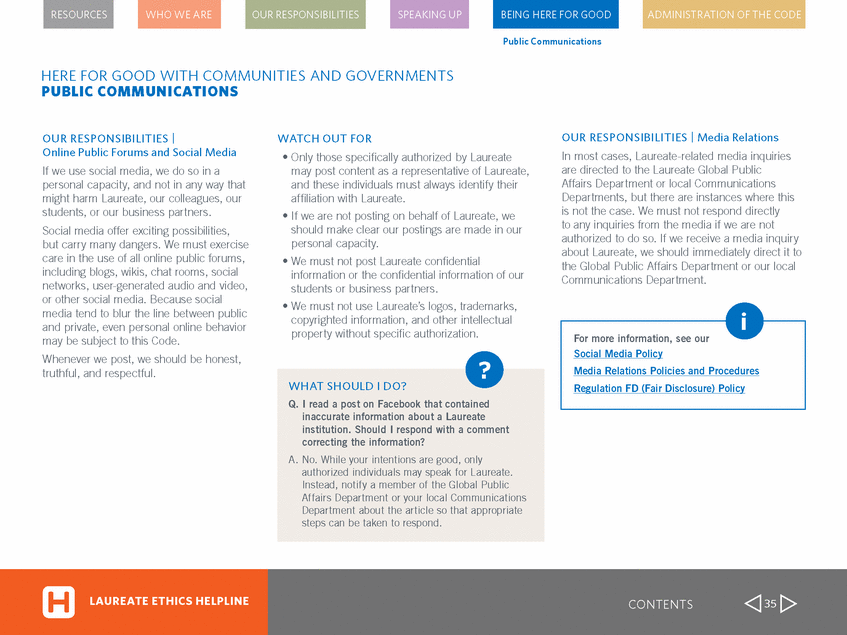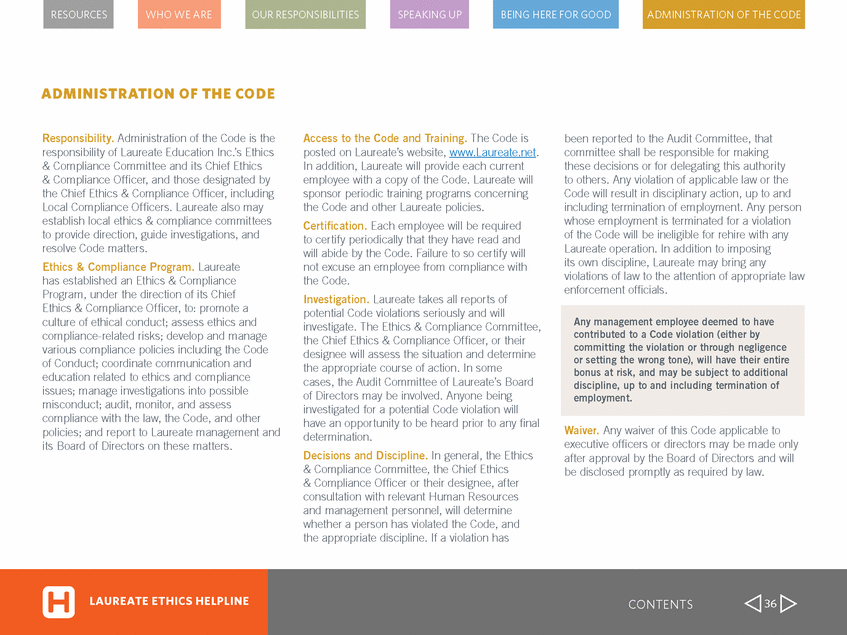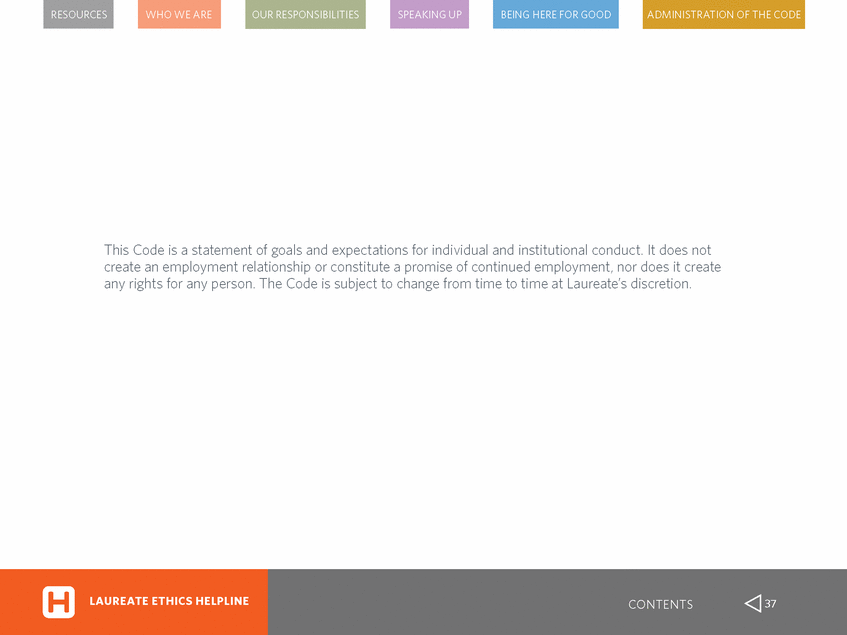Attached files
| file | filename |
|---|---|
| 8-K - 8-K - LAUREATE EDUCATION, INC. | a18-5165_18k.htm |
|
|
HERE FOR OUR STUDENTS HERE FOR OUR PARTNERS HERE FOR FACULT Y HERE FOR OUR EMPLO EES HERE FOR COLL ABOR ATION HERE FOR OUR COMMUNITIES FOR EDUCATION HERE FOR INN HERE FOR INTEGRIT Y HERE FOR EMPLOYEES HERE FOR GOOD H FOR INNOVATION HERE FOR ED TION HERE FOR OUR STUDENTS THE LAUREATE CODE OF CONDUCT AND ETHICS |
|
|
MESSAGE FROM THE CEO Here for Good. It is the Laureate spirit, the energizing principle that drives us. We strive for permanence and purpose, and always to do the right thing. By acting this way, we have earned the trust of our students and their families, our partners, our communities, and each other. This is our greatest asset. Protecting it is the job of everyone at Laureate. Acting ethically and in accordance with the law is at the very core of who we are. Maintaining our integrity, being Here for Good, is more important than any financial gain. We have incorporated as a benefit corporation for this reason: we believe we are here to achieve much more than short-term business results. The Code of Conduct and Ethics is central to that effort. We have titled it “Here for Good” to emphasize this point. The Code sets out principles of integrity and ethical behavior, and our responsibilities to each other, our students, suppliers, stockholders, and the public. The Code sets a baseline; it does not cover every issue that may arise, but it establishes standards and a methodology to help guide us. Read the Code and refer to it often. If you are uncertain about the right course of action, or if you observe conduct that may violate the Code, seek guidance. Our serious commitment to the Code, and all it represents, is critical to our long-term success. Eilif Serck-Hanssen Chief Executive Officer Laureate Education, Inc. 2 |
|
|
THE CODE AT A GLANCE To be Here for Good, we must not only do good, but be good. We each must accept our responsibility to promote integrity and ethical conduct in all our activities. We have a responsibility to ask for help when we are unsure of the appropriate action, and speak up when we see something that looks wrong. We have several options for help and reporting, including our Local Compliance Officer and the confidential Laureate Ethics Helpline. HERE FOR GOOD INSIDE LAUREATE • All Laureate records–including not only financial accounts, but all electronic or written records such as student grades and attendance records, expense reports, and time sheets–accurately and fairly reflect the underlying event or transaction. • We use Laureate assets for legitimate purposes related to our operations and protect the assets and intellectual property of others. • We protect Laureate’s confidential information, safeguard others’ personal information, and do not purchase or sell Laureate stock based on material nonpublic information. HERE FOR GOOD WITH OUR PARTNERS • When working for Laureate, we advance Laureate’s best interests. If a situation might be perceived as a conflict of interest, we must disclose it. • We must never offer or accept business courtesies under circumstances where they could improperly affect, or appear to improperly affect, decision making. • We must not take advantage of anyone through manipulation, concealment, misrepresentation of facts, or any other unfair dealing. • We comply with all applicable laws on antitrust and competition, international trade, and anti-money laundering. HERE FOR GOOD WITH COMMUNITIES AND GOVERNMENTS • We do not offer or accept bribes or improper payments of any kind, whether in dealings with public officials or individuals in the private sector, including students. • We must consult Laureate legal counsel before engaging in any political activity on behalf of Laureate. • We must never make a charitable contribution for an improper purpose, or when it may create the appearance of a bribe. • If we use social media, we do so in a personal capacity, and not in any way that might harm Laureate, our colleagues, students, or business partners. • If we receive a media inquiry about Laureate, we should immediately direct it to the Global Public Affairs Department or our local Communications Department. 3 |
|
|
HERE FOR GOOD: LAUREATE’S CODE OF CONDUCT AND ETHICS I RESOURCES .............................................................................................................................................................. 5 I WHO WE ARE ......................................................................................................................................................... 7 I OUR RESPONSIBILITIES.......................................................................................................................................... 9 I SPEAKING UP.......................................................................................................................................................... 11 I BEING HERE FOR GOOD ........................................................................................................................................ 12 I HERE FOR GOOD INSIDE LAUREATE........................................................................................................... 12 Accurate Records And Reporting........................................................................................................................................... 12 Protecting Assets ......................................................................................................................................................................16 Protecting Information ..............................................................................................................................................................18 Data Privacy.................................................................................................................................................................................19 Insider Trading ...........................................................................................................................................................................20 I HERE FOR GOOD WITH OUR PARTNERS ................................................................................................... 21 Conflicts Of Interest ..................................................................................................................................................................21 Gifts, Meals, Entertainment, and Other Business Courtesies ....................................................................................... 25 Fair Dealing ................................................................................................................................................................................. 26 Antitrust and Competition ...................................................................................................................................................... 27 International Trade ................................................................................................................................................................... 28 Money Laundering .................................................................................................................................................................... 29 I HERE FOR GOOD WITH COMMUNITIES AND GOVERNMENTS ........................................................... 30 Bribery and Corruption ...........................................................................................................................................................30 Political Activities and Contributions ................................................................................................................................... 33 Charitable Contributions ........................................................................................................................................................ 34 Public Communications ........................................................................................................................................................... 35 I ADMINISTRATION OF THE CODE ...................................................................................................................... 36 4 |
|
|
RESOURCES The Code of Conduct and Ethics provides general principles and guidance in a wide variety of situations, but cannot dictate a specific course of action for every possible circumstance. Even after reading the Code and taking required training, we may have questions about appropriate conduct in a particular circumstance, or we may observe something that may be a violation of the Code or the law. We have a responsibility to ask for help when we are unsure of the appropriate action, and speak up when we see something that looks wrong. We have several resource and reporting options. For employment-related issues such as harassment, discrimination, bullying or other interpersonal conflicts, we should contact Human Resources or raise the issue to our supervisor. i and procedures are published. All policies be reached in case of any questions. 5 OTHER RESOURCES • The Laureate Policy Site, is where policies have an owner or contact person who can • The Laureate Ethics & Compliance Site includes more information on the Code, other related policies, educational materials, and additional resources. www.LaureateEthics.net The Helpline is available at all times, through the website or the toll-free numbers listed on the site, and accepts reports in any language. The Helpline is staffed by an independent professional service provider who will forward questions and concerns to Laureate Ethics & Compliance personnel in confidence for handling. We can even submit reports anonymously. WHO IS MY LOCAL COMPLIANCE OFFICER? Your Local Compliance Officer is the official contact in your institution or geographic region designated to address questions about the Code, receive reports of possible misconduct, help resolve issues, and provide certain approvals under the Code. WE MAY CONTACT • Our supervisor or higher levels of management • Our Local Compliance Officer • The Legal or Human Resources Department • The Laureate Ethics Helpline |
|
|
FOUNDER’S MISSION Laureate is an international community of universities that encourages learning without boundaries. Our purpose is to offer higher education with a unique multicultural perspective, and prepare our students for exciting careers and lifelong achievement. We believe that when and societies benefit. our students succeed, countries prosper Douglas L. Becker Founder & Chairman Laureate Education, Inc. 6 |
|
|
WHO WE ARE As the largest global network of degree-granting higher education institutions, Laureate has an inherent mission to provide high-quality educational opportunities to students worldwide. We believe society is best served when our students, faculty, and entire network use their collective skills and experiences to create positive and enduring change. Laureate students and graduates are improving lives and communities every day. Our institutions are providing the critical skills, knowledge, and support to make this happen. This commitment is best expressed through our Spirit of being “Here for Good.” Every Laureate institution makes a commitment to both permanence and purpose in their communities, believing that when students succeed, countries prosper and societies benefit. PUBLIC BENEFIT Laureate was conceived from the very beginning as a social enterprise, one committed to expanding access to quality higher education in a way that combines the principles of business with the heart of service that defines so many non-profit organizations. This has been the focus since Laureate’s first investment in higher education in 1999, and in 2015, Laureate formalized this commitment in its legal structure by converting to a Public Benefit Corporation (PBC), a new class of corporation in the United States required by law to create a general public benefit through a material, positive impact on society. Laureate’s specific benefit purpose is to produce a positive effect for society and students by offering diverse education programs both online and at campuses around the globe. On February 1, 2017, Laureate became the first PBC in the world to have its stock traded on a public stock exchange. We believe in the power of education to transform lives, and we are committed to making an enduring impact in the communities we serve. We see our conversion to a PBC and our certification as a B Corp™ as a natural progression for the Laureate Movement. 7 Laureate has passed a rigorous assessment by B Lab™, an independent non-profit organization, in order to be certified as a B Corp™, confirming that Laureate meets the highest standard of overall social and environmental performance, public transparency, and legal accountability. At the time of our certification, Laureate was the largest corporation ever to become a B Corp™. |
|
|
WHO WE ARE TRUSTWORTHINESS AND THE LAUREATE MOVEMENT We earn this trust through our actions. It can take years to earn trust, but an instant to lose it through improper conduct. Across all levels of our organization, we hold ourselves to the highest standards, act with integrity, and are accountable for our actions. Our Dream is “To be universally admired as the catalyst for bringing life-changing quality higher education for all.” We can achieve this dream, but only by being Here for Good. To be Here for Good, we must not only do good, but be good. If we are to achieve permanence and purpose, we must behave ethically and in accordance with the law, and avoid any suggestion of impropriety, or conduct that may undermine our reputation or credibility. The Code of Conduct and Ethics is an essential guide for being Here for Good. The Code defines critical aspects of how we should conduct ourselves. It addresses our responsibilities to Laureate, to each other, and to all those with whom we engage. We must follow the law, act ethically at all times, and seek help when we are uncertain. The Laureate Movement defines our culture, and what it means to be part of the Laureate network. Essential to the Movement is Our Character–the attributes that define who we are, and make Here for Good real. And at the heart of who we are is Trustworthiness. Across all levels of our organization, we hold ourselves to the highest standards, act with integrity, and are accountable for our actions. i Our success depends on the countless ways in which others depend on us, and on our living up to that responsibility. To be Here for Good, we must earn the trust of our students and their families, employers, and the communities in which we operate. We must earn the trust of investors, our strategic partners, and governments. To be Here for Good, we must not only do good, but be good. 8 For more information, see the Laureate Movement Website |
|
|
We We We We We We are trustwo follow the avoid acti avoid eve ask for he speak up law ns that may call into question Laureate’s integrity the appearance of wrongdoing p when unsure of the appro riate action hen we see something tha looks wrong WE ARE HERE FOR GOOD 9 |
|
|
OUR RESPONSIBILITIES ? We are committed to acting honestly and ethically. This means that we each must accept our responsibility to promote integrity and ethical conduct in all of our activities. But situations will arise in which the proper course of conduct may not be obvious. The key is to exercise good judgment. This means following the spirit of the Code and the law, and always doing the right thing. We should ask ourselves: • Am I acting honestly? • Am I acting consistently with the Code and the law? • Could my actions harm Laureate or my institution? • Am I treating others fairly and respectfully? • Would I want to see my actions reported on the Internet or in the media? • What would my colleagues, friends, and family think of this decision? • Am I acting consistently with my values and Laureate’s values? “Just this once.” “I deserve this for all my hard work.” “It’s only a small deviation.” It can be easy to rationalize misconduct. Stop and think if you hear yourself saying: “Everyone else seems to be doing it.” “This used to be acceptable.” In the end, we are all responsible for our own behavior. “It’s not really right, but my boss wants me to do it.” 10 WHAT SHOULD I DO? Q. My manager has asked me to do something that I think violates the Code. What should I do? A. Talk to your manager about it. You may have misunderstood what you were being asked to do, or your manager may have overlooked relevant facts or circumstances. If this does not resolve the matter, or you don’t feel comfortable raising the issue with your manager, speak up. Under no circumstances should you take any action that violates the Code. If you violate the Code, the fact that your manager asked you to do something will not protect you against disciplinary action. |
|
|
OUR RESPONSIBILITIES LEADERS | Being the Example Leaders set the tone. They act as role models, and communicate behavioral expectations. Leaders must: • Be an example of ethical behavior and appropriate conduct at all times. • Take steps to ensure that those they manage understand and follow the Code. • Never encourage or direct others to achieve results at the expense of compliance with the law or the Code. • Create a culture that rewards appropriate conduct and avoids undue pressure to achieve results. • Create an environment where everyone feels comfortable asking for help and expressing concerns. We all should feel encouraged to speak up and raise concerns without fear of retaliation. • Provide guidance and assist others in resolving questions concerning the Code. • Get help when necessary in answering questions or responding to concerns about the law or the Code. FACULTY | Educating with Integrity Our students are our highest priority. We provide a learning environment that fosters student success. Faculty members are representatives of both Laureate and their institutions, and must demonstrate ethical behavior, academic integrity, professionalism, and respect in dealings with students, parents, colleagues, and communities. Faculty also must follow policies related to their particular areas of responsibility, including academic integrity standards and research ethics. 11 TO WHOM DOES THE CODE APPLY? The Code applies to every Laureate employee and faculty member. References in this Code to “Laureate” includes Laureate Education, Inc., and its direct and indirect wholly-owned subsidiaries and those affiliated entities controlled by Laureate Education, Inc. Our suppliers are expected to adhere to the separate Code of Conduct and Ethics for Suppliers. Any management employee deemed to have contributed to a Code violation (either by committing the violation or through negligence or setting the wrong tone), will have their entire bonus at risk, and may be subject to additional discipline, up to and including termination of employment. THE CODE AND OTHER REQUIREMENTS Laureate is committed to compliance with all laws applicable to its operations. Under certain circumstances, applicable law may establish requirements that differ from this Code. If there is a conflict between the law and this Code, we must comply with the law. If the Code is more restrictive, we should follow the Code. Our institutions also may impose requirements regarding our conduct through local policies. If there is a conflict between local policies and the Code, we should follow the more restrictive rule. If we are uncertain, we should consult our Local Compliance Officer. |
|
|
SPEAKING UP SPEAKING UP WHY WE RAISE CONCERNS We all have an obligation to maintain Laureate’s reputation for ethical conduct and to continue to earn the trust of all those affected by our operations. This means taking action to prevent violations of the law or the Code By raising ethics and compliance concerns, we help protect ourselves, our students, our institutions, and Laureate. Raising concerns gives Laureate the opportunity to deal with the issue and correct it, ideally before it becomes a violation of the law or a risk to others. We should speak up if we have a question about appropriate conduct, or if we observe behavior that concerns us, even if we are not certain that a violation has occurred. HOW WE RAISE A CONCERN If we have a question, or suspect that there has been a violation of the law, our Code, or a Laureate policy, we have several options to get help, described in the Resources section of this Code. We may raise a concern anonymously, but we are encouraged to identify ourselves to facilitate investigation and further communication. If we make our identity known, Laureate will take every reasonable precaution to keep our identity confidential, consistent with conducting a thorough and fair investigation. Reports of suspected violations should always be made honestly. It is a violation of the Code to knowingly make a false accusation. WHAT HAPPENS WHEN WE RAISE A CONCERN Laureate takes all reports of possible misconduct seriously and will investigate. Prompt reporting when we suspect a Code violation is vital to ensuring a thorough investigation and timely resolution. During the investigation process, relevant Laureate personnel will: 1. Form an investigation plan, including identification of appropriate investigators 2. Determine the facts through interviews and review of documents 3. Determine corrective action, if necessary We should not try to investigate or resolve a matter on our own, but if we become involved in a Code investigation, we should cooperate fully and answer all questions completely and honestly. Any interference with a Code investigation is a Code violation. By raising ethics and compliance concerns, we help protect ourselves, our students, our institutions, and Laureate. 12 |
|
|
SPEAKING UP NO RETALIATION Laureate has zero tolerance for retaliation. We do not allow anyone to be treated badly because they have raised an issue honestly. Any retaliation against a person who raises a Code concern honestly or participates in a Code investigation, is a violation of the Code and grounds for disciplinary action, including dismissal. Retaliation can take many forms, including intimidation, denial of a promotion, a poor performance review, or termination of employment. And it can include subtle actions, like failure to include someone in social activities to which they might otherwise have been invited. All of this behavior is prohibited if it is meant to punish someone for having raised a concern. We all must remain vigilant for signs of retaliation, in our own conduct, and in the conduct of others. If we work with someone who has raised a concern or provided information in an investigation, we should continue to treat the person with courtesy and respect. If we believe someone has been retaliated against, we should report the matter. Laureate has zero tolerance for retaliation. 13 |
|
|
Accurate Records and Reporting HERE FOR GOOD INSIDE LAUREATE ACCURATE RECORDS AND REPORTING OUR RESPONSIBILITIES The accuracy of our books and records is critical to our operations, and to our reputation and credibility. These records are necessary for our internal decision making, and form the basis of our reporting to investors, government agencies, and others. All Laureate records– including not only financial accounts, but all electronic or written records such as student grades and records, expense reports, and time sheets–accurately and fairly reflect the underlying event or transaction. All reports and documents that Laureate submits to any government agency or other third party, and all other public communications and disclosures made by Laureate, must be full, fair, accurate, timely, and understandable. WATCH OUT FOR We must: • Not falsify any document. • Record all financial transactions in the proper account, department and accounting period. • Follow all internal controls. • Provide prompt and accurate answers to all inquiries made to us in the preparation of public reports and disclosures. • Raise any concerns about the accuracy of our records or the effectiveness of our internal controls. Accurate records are everyone’s responsibility, not just Accounting and Finance. These records include all Laureate documents, written and electronic. 14 |
|
|
Accurate Records and Reporting HERE FOR GOOD INSIDE LAUREATE ACCURATE RECORDS AND REPORTING ? CONTRACTS Among the most important Laureate records are the contracts by which we commit our resources and agree to certain actions. We must ensure that any contractual commitment is properly negotiated, reviewed, approved, executed, reported, recorded, and retained. For more information, see our Contract Management Policy. If we are uncertain how to account for a transaction, we should consult relevant Finance personnel. RECORD RETENTION We must: • Retain all records for the period of time specified in any applicable record retention schedule, and then properly dispose of them in accordance with the applicable record retention policy. • Abide by all notices to retain records in the event of litigation or government investigation. 15 WHAT SHOULD I DO? Q. I’ve gone over budget on marketing expenses, but if I delay submitting some of the vendors’ invoices until next quarter, I can cover some of the excess. Is that OK? A. No. We must always record expenses in the accounting period in which they were incurred. Q. I’m in Sales and I’m short on my enrollment target for the month. I have spoken to a few prospective students who I believe will enroll soon. If I put them in the system now, I can make my quota, and everything will be OK when they do enroll. A. Don’t do it. Recording enrollments in the system before they occur is falsification of our records. Laureate reports enrollment numbers to the public, and they must be accurate. Falsification of this sort is grounds for dismissal. |
|
|
Protecting Assets HERE FOR GOOD INSIDE LAUREATE PROTECTING ASSETS OUR RESPONSIBILITIES We use Laureate assets for legitimate purposes related to our operations. We protect our assets: • Keeping computers, laptops, and mobile devices secure • Never using these assets for illegal or improper purpose–including gambling, pornography, or to further a business outside of Laureate–or in any manner that is contrary to Laureate’s policies or the Code • Using assets, such as research grant funds, only for their intended purpose We use technology responsibly: • Creating strong passwords, keeping them safe, and never sharing them • Making limited personal use of Laureate technology assets • Keeping to a minimum the transfer to a Laureate computer of any data, information, or software that is not intended for use in our operations 16 Laureate may access, publish, or retain any information on any of Laureate’s computers or email systems, where permitted by applicable law. WHAT ARE LAUREATE ASSETS? Tangible assets include: • physical property (including equipment, supplies, and real estate) • money and financial equivalents • computer systems, software, and electronic devices Intangible assets include: • intellectual property such as trade secrets, patents, trademarks, and copyrights • business and marketing plans • curricula, designs, and databases, • records (including student and employee records, salary information, contact information lists) • unpublished financial data and reports • student lists |
|
|
Protecting Assets HERE FOR GOOD INSIDE LAUREATE PROTECTING ASSETS i ? WATCH OUT FOR We also protect the assets and intellectual property of others. • We must not make copies of, or resell or transfer, copyrighted publications (including software, articles, books, curricula, and databases) as well as confidential and proprietary information of others, unless authorized to do so under an appropriate license agreement. • We do not bring to Laureate work product or intellectual property that belong to our former employers. • Using another’s written or electronic materials without attribution or appropriate consent is plagiarism or infringement. It is a violation of the Code, and may be a violation of the law. We also protect the assets and intellectual property of others. 17 WHAT SHOULD I DO? Q. It’s been a busy day, and I have not had a chance to get out of the office for a break. Can I use my Laureate computer to complete a personal online banking transaction? A. Yes. Limited personal use of Laureate systems is acceptable if it does not interfere with your ability to do your job, Laureate operations, or the operation of our systems. For more information, see our Information Security & IT Compliance Portal Intellectual Property and Plagiarism Policy |
|
|
Protecting Information HERE FOR GOOD INSIDE LAUREATE PROTECTING INFORMATION ? OUR RESPONSIBILITIES We protect Laureate’s confidential information from unauthorized use or disclosure. Improper disclosure of Laureate’s confidential information could harm Laureate or our students, or give an unfair advantage to our competitors. WATCH OUT FOR • We must not share Laureate’s confidential information with anyone, inside or outside Laureate, unless they have a legitimate reason to know, or disclosure is required by law. • We must follow all policies related to the protection and classification of confidential information. • When sharing confidential information outside Laureate, we should take appropriate action, such as the execution of a confidentiality agreement, to protect against misuse. i 18 For more information, see our Information Asset Classification and Handling Policy Information Asset Classification and Handling Standard WHAT IS CONFIDENTIAL INFORMATION? Confidential information includes all proprietary or non-public information, whether created inside Laureate or entrusted to us by students or others. Examples include: • Laureate’s trade secrets • information related to individual employees, faculty members, or students • trends and projections • information about financial performance • targets and budgets • marketing plans • enrollment trends • lead flow, conversion, and graduation rates; • academic programs or degrees in development; • growth or expansion plans • information about potential acquisitions, divestitures, and investments • securities offerings; significant personnel changes • existing or potential major contracts, orders, suppliers, or finance sources WHAT SHOULD I DO? Q. I received an internal email with confidential information. I know I can’t share it with anyone outside of Laureate who isn’t authorized to see it, but can I share it with a coworker? A. You should only share confidential information with other employees who are authorized to see it and need to know the information as part of their job. |
|
|
Data Privacy HERE FOR GOOD INSIDE LAUREATE DATA PRIVACY ? OUR RESPONSIBILITIES Laureate is entrusted with personal information about our students, employees, and business partners. We must safeguard this information as we would our own. WATCH OUT FOR Those of us who have access to the personal data of others must: • Handle that data in accordance with applicable law and any relevant privacy policies or contractual obligations. • Prevent unauthorized disclosure. • Collect, use, and process such information only for legitimate purposes. • Limit access to the information to those who have a legitimate purpose for seeing it and who are trained in the proper handling of this information. • Consult with our local IT team to understand how best to protect these data. i Handling Policy Handling Standard 19 For more information, see our Information Asset Classification and Information Asset Classification and WHAT ARE “PERSONAL DATA”? Examples include: • address • age • race • religion • sexual orientation • employment and salary information • student grades and other records • medical information • financial account numbers • government identification numbers • criminal convictions • political affiliations WHAT SHOULD I DO? Q. I am in discussion with a vendor for certain services that will require the vendor to store and use personal data of our students and potential students. Is there anything I need to do to protect these data? A. Consult with IT Security before entering into a contract with the vendor or transferring any personal data to them. IT Security can ensure that the necessary protections are in place. |
|
|
Insider Trading HERE FOR GOOD INSIDE LAUREATE INSIDER TRADING WATCH OUT FOR In general, material information is information that would be expected to affect the investment or voting decisions of a reasonable investor or stockholder. Non-public information is information that has yet to be announced to the public through an authorized disclosure. Material non-public information may include: • Potential acquisitions and divestitures • Enrollment data or trends • Internal projections • Targets and budgets • Financial results • Growth or expansion plans • Changes to the senior management team • New, or changes to, major contracts • New academic programs in development • Significant litigation or labor disputes • Significant regulatory or accreditation approvals or denials • Marketing strategies • Lead flow, conversion rates, and graduation rates OUR RESPONSIBILITIES The law and Laureate policy prohibit the purchase or sale of Laureate stock or other securities, directly or indirectly, based on material nonpublic information. If we have material nonpublic information about Laureate, we must not engage in transactions involving Laureate securities until this information has been released to the public. It is also illegal to pass such information to a friend or family member, or anyone else, so that they may trade. We also must refrain from trading the stock of other companies, such as existing or potential suppliers, using material non-public information obtained during our relationship with Laureate. Some of us, because of our position at Laureate, have regular access to material nonpublic information. We will be notified by Laureate legal counsel if we are in this group, and will be subject to the additional restrictions set forth in our Insider Trading Policy, including a requirement to pre-clear any trades in Laureate securities. i 20 For more information, see our Insider Trading Policy |
|
|
Conflicts of Interest HERE FOR GOOD WITH OUR PARTNERS CONFLICTS OF INTEREST i OUR RESPONSIBILITIES When working for Laureate, we advance Laureate’s best interests. A conflict of interest arises when our personal activities and relationships interfere, or may appear to interfere, with our ability to act in the best interest of Laureate. Acting in furtherance of personal interests when those interests conflict with Laureate’s can harm the organization, and even the appearance of a conflict may cause others to doubt our fairness. If there is a chance that a situation might be perceived as a conflict of interest, we must disclose it to our supervisor and our Local Common conflict of interest situations include: • Having a financial interest in a company that does business with Laureate. • Receiving compensation or other incentives from a company that does business or seeks to do business with Laureate, or that competes with us. • Holding a second job that interferes with our ability to do our Laureate job. • Hiring a supplier that is managed or owned by a relative or close friend. • Allowing personal relationships at work to influence, or create the appearance of influencing, our ability to act in the best interest of Laureate. Conflicts of interest can take many forms. The Code can’t address every potential conflict of interest situation, so we must use good judgment and seek guidance when unsure. Compliance Officer (or use the Conflict of Interest Disclosure Form) and take steps to get it resolved. A conflict of interest is not necessarily a Code violation. Failing to disclose a conflict is. 21 We can disclose a potential conflict using the online Conflict of Interest Disclosure Form |
|
|
Conflicts of Interest HERE FOR GOOD WITH OUR PARTNERS CONFLICTS OF INTEREST ? WATCH OUT FOR | Outside Interests We avoid investments or other financial interests that could interfere, or appear to interfere, with our ability to make decisions in the best interest of Laureate. We must not: • Hold a financial interest in, or receive any personal benefit from, any Laureate supplier we deal with on Laureate’s behalf, unless we have Local Compliance Officer approval. • Take for our own benefit, or that of a friend or family member, any business opportunity, including acquiring an interest in real or intellectual property, in which Laureate has, or might have, a legitimate interest. • Receive a loan from Laureate if we are a Laureate executive officer 22 WHAT SHOULD I DO? Q. I have to select a new supplier to provide certain technology services on campus. My brother owns a technology company that I know will do a good job, and he’ll give us a good price. Can I hire my brother’s company? A. You should not be involved in the selection process, as it might appear to others that you are favoring your brother rather than making an objective decision. You should notify your supervisor and Local Compliance Officer of your potential conflict of interest, and remove yourself from the decision-making process. Others can make the selection decision, and if your brother’s company offers good service at a good price, he will be seriously considered. |
|
|
Conflicts of Interest HERE FOR GOOD WITH OUR PARTNERS CONFLICTS OF INTEREST WATCH OUT FOR | Family and Friends Many of us have relatives or friends who have business relationships with Laureate, our suppliers, or competitors. These circumstances can raise conflict of interest questions because others might think we are favoring these relationships above Laureate’s interests. • We must seek Local Compliance Officer RELATIONSHIPS WITH STUDENTS Nothing is more important than our students. For those who interact with students, particularly faculty members, we must take care with the relationships we build. Getting to know students, and developing friendships with them, is admirable, but: • We must not let personal relationships interfere with treating students fairly and grading their work objectively. • We must avoid romantic relationships with students if we are teaching them or otherwise dealing with them in a professional capacity. • We must not take advantage of the teacher-student relationship by offering students commercial services—such as tutoring for pay—outside Laureate. approval before we can deal with a company on Laureate’s behalf if we have a relative who is employed by the company, or if our relative owns more than 1% of the company. • In general, we should not supervise relatives, either directly or indirectly. Local Compliance Officer approval is required for any exceptions. • We should take care not to allow friendships, either at work or outside, to interfere with our ability to act in Laureate’s best interests. 23 WHO IS A “RELATIVE” UNDER THE CODE? • spouse • domestic partner • parent • child • grandchild • sibling • mother-or father-in-law • brother-or sister-in-law. Even when dealing with relatives other than those described above, we should take care not to let our relationship interfere with our responsibilities to Laureate. |
|
|
Conflicts of Interest HERE FOR GOOD WITH OUR PARTNERS CONFLICTS OF INTEREST ? WATCH OUT FOR | Outside Employment If we work outside Laureate, we ensure that these other duties do not interfere with our ability to perform our job for Laureate. • We must not be employed by, or receive any compensation or loan from, a Laureate supplier if we deal with them on Laureate’s behalf. • We must not be employed by, or receive any compensation from, a non-Laureate institution of higher education. There is an exception for faculty not in a management position, who are allowed to provide services to other educational institutions. Other situations require Local Compliance Officer approval. EMPLOYEES AS STUDENTS Laureate faculty and employees may, from time to time, enroll as students at a Laureate institution. This is perfectly acceptable, but instructors should take care not to treat these students differently because they are employees. • We must not serve as an officer or director of any for-profit company or any higher-education institution outside of Laureate without first seeking Local Compliance Officer approval. – Approval is not necessary for service in a family-owned business or a professional, community, or charitable organization, unless the business or organization is a Laureate supplier or competitor. – Part-time faculty need to seek approval only to serve as an officer or director of a higher-education institution. 24 WHAT SHOULD I DO? Q. I am an accountant, and one of the vendors with whom I occasionally interact has asked me to do some part-time accounting work for them in the evening and on weekends. I would like the extra money. Can I accept the job offer? A. No. Accepting a job from a vendor with whom you interact on behalf of Laureate might create the appearance that the vendor is trying to influence your decision making on behalf of Laureate. |
|
|
Gifts, Meals, Entertainment, and Other Business Courtesies HERE FOR GOOD WITH OUR PARTNERS GIFTS, MEALS, ENTERTAINMENT, AND OTHER BUSINESS COURTESIES ? WATCH OUT FOR • Business courtesies should be reasonable, infrequent, and modest in amount, as well as consistent with internal policy, applicable law, custom, and practice. • We must never offer gifts, meals, entertainment, or travel to anyone to obtain or retain licenses, approvals, business, or any other type of improper advantage. • Offering or accepting gifts, meals, entertainment, or other business courtesies above certain monetary thresholds requires Local Compliance Officer approval, as required OUR RESPONSIBILITIES Offering or receiving gifts, meals, entertainment, hosted travel, or other courtesies can be a legitimate means of strengthening relationships, but we must never offer or accept such courtesies under circumstances where they could improperly affect, or appear to improperly affect, decision making. In general, such business courtesies given to or received from suppliers, students, and others outside Laureate must be related to a legitimate purpose and given or received without expectation of any improper influence or advantage. by the Policy on Gift, Meals, Entertainment, Sponsored Travel, and Other Business Offering or accepting gifts, meals, entertainment, or other business courtesies above certain monetary thresholds requires Local Compliance Officer approval. i Courtesies. • We must never give or receive gifts of cash or cash equivalents in our dealings with outside parties. • Faculty may accept modest gifts from students, but not under circumstances where it might appear that the gift is an attempt to influence. • Consult local policies on gifts, meals, and entertainment. 25 For more information, see our Anti-Corruption Policy Policy on Gift, Meals, Entertainment, Sponsored Travel, and Other Business Courtesies Global Travel & Entertainment Policy U.S. Policy on Government-Related Business Courtesies, Political Contributions, and Lobbying WHAT SHOULD I DO? Q. I am in the process of selecting a supplier for an important project, and a sales representative for one of the suppliers bidding on the project would like to take me to dinner to discuss the proposal. Is it OK for me to let her pay for the dinner? A. No. Modestly priced meals generally are acceptable, but in these circumstance— where you are actively selecting a supplier—accepting the meal would create the appearance of improper influence. |
|
|
Fair Dealing HERE FOR GOOD WITH OUR PARTNERS FAIR DEALING i WATCH OUT FOR Examples of prohibited conduct include: • Bribery or payoffs to enhance our operations • Acquiring a competitor’s trade secrets or confidential information through bribery, theft, or misrepresentation • Making false, deceptive, or disparaging claims or comparisons about competitors or their products or services • Mislabeling or misrepresenting products or services • Making misrepresentations to students and prospective students about course offerings or post-graduation employment OUR RESPONSIBILITIES Being Here for Good means dealing honestly with Laureate’s students, suppliers, competitors, and each other. We must not take advantage of anyone through manipulation, concealment, misrepresentation of facts, or any other unfair dealing. Fair dealing is of particular importance in our interactions with prospective students, as we encourage them to consider enrolling at one of our institutions. We must always do so honestly and without deception. We must not take unfair advantage of anyone through manipulation, concealment, misrepresentation of facts, or any other unfair dealing. 26 For more information, see our Anti-Corruption Policy |
|
|
Antitrust and Competition HERE FOR GOOD WITH OUR PARTNERS ANTITRUST AND COMPETITION OUR RESPONSIBILITIES We compete fiercely, but fairly. We follow all applicable antitrust and competition laws. These laws are designed to protect consumers and competitors against unfair practices and to promote and preserve competition. We grow responsibly and by providing exceptional education – not through prohibited or anticompetitive practices. These include: • Price Fixing. Laureate may not agree with its competitors to raise, lower, or stabilize prices or any element of price, including discounts and credit terms. – For example: Laureate and a competitor university may not agree to set a fixed price for a course offering. • Limitation of Supply. Laureate may not agree with its competitors to limit its enrollment or otherwise restrict the supply of its services. – For example: Laureate and a competitor university may not agree to offer only certain courses or programs and not offer others. WATCH OUT FOR • We must exercise caution in meetings with competitors, as any meeting with a competitor may give rise to the appearance of impropriety. • We should avoid any communication with a competitor regarding prices, costs, market share, revenues, supplier terms and conditions, product offerings, bids for any contract or program, selection and retention of students, or distribution and marketing methods. • We should be careful when attending meetings of professional organizations and trade associations at which competitors are present. We should not discuss pricing policy or other competitive terms, plans for new or expanded offerings, or any other proprietary, competitively sensitive information. If we have any doubt about the legality of a particular action or arrangement, we should consult the Legal Department or our Local • Allocation of Business. Laureate may not agree with its competitors to divide or allocate markets, territories, or customers. – For example: Laureate may not agree with a competitor university to recruit only from a particular geographic area in return for an agreement from that university to focus on a different area. • Boycott. Laureate may not agree with its competitors to refuse to sell or purchase products from third parties. In addition, Laureate may not prevent a student from purchasing or using non-Laureate products or services. – For example: Laureate cannot prevent a student from simultaneously taking courses at competitor universities. Compliance Officer. 27 |
|
|
International Trade HERE FOR GOOD WITH OUR PARTNERS INTERNATIONAL TRADE OUR RESPONSIBILITIES Trade Regulations Many countries periodically impose restrictions on exports and other dealings with certain other countries, persons, or groups, often because they are believed to support terrorism, narcotics trafficking, or other crimes. Export laws may control trading of commodities, technologies, or services that have the potential to be used for military purposes. Laws also restrict travel to or from a sanctioned country, imports or exports, new investments, and other related transactions. These laws are complex, and subject to frequent change. Those of us whose work involves the transfer of products, technologies, or services across international borders, or who are engaged in enrolling students who reside in other countries, should consult with the Legal Department or our Local Compliance Officer to ensure compliance WATCH OUT FOR The most comprehensive sanctions regimes, as of 2018, relate to Crimea, Cuba, Iran, and North Korea. The scope and severity of these sanctions programs change from time-to-time as world politics change, but if we are contemplating any business or recruiting in these countries, we should contact the Legal Department or our Local Compliance Officer for guidance. Anti-Boycott By law, Laureate may not support or cooperate with an unsanctioned boycott of another country that is “friendly” to the United States. Laureate must report to the U.S. government any request to support such a boycott, regardless of where in the world the request comes from. We may receive this type of request in a bid invitation, purchase contract, letter of credit, or orally. We must notify the Legal Department or our Local Compliance with any laws or restrictions that might apply. Officer immediately if we learn of a request to support such a boycott. 28 VENDOR SCREENING We have established a screening process to check our vendors and potential vendors against sanctions lists, and to preclude any relationship in the unlikely event that any of these vendors are on the lists. If we detect a vendor who is on a sanctions list, we may have to stop doing business with them, or be prohibited from entering into an agreement with them. |
|
|
Money Laundering HERE FOR GOOD WITH OUR PARTNERS MONEY LAUNDERING OUR RESPONSIBILITIES Laureate is committed to complying fully with all applicable anti-money laundering laws. We must conduct business only with reputable business partners, involved in legitimate business activities, with funds derived from legitimate sources. We must prevent any involvement in money laundering by recognizing questionable financial transactions and conducting appropriate due diligence of our business partners. WATCH OUT FOR • Vendor requests for payments to multiple accounts, or using various forms of payment • Suppliers or business partners who provide incomplete, false, or suspicious information about themselves, or the company they represent • Suppliers or business partners who want to avoid keeping records or reporting on their transactions If we observe any unusual activity that could indicate money laundering, we should contact the Legal Department or our Local Compliance Officer immediately. 29 WHAT IS MONEY LAUNDERING? Money laundering is the process of concealing or disguising the identity of illegally obtained proceeds so that they appear to have originated from legitimate sources. Money laundering is often used to support crime or terrorism. |
|
|
Bribery & Corruption HERE FOR GOOD WITH COMMUNITIES AND GOVERNMENTS BRIBERY & CORRUPTION ? OUR RESPONSIBILITIES We do not offer or accept bribes or other improper payments of any kind, whether in dealings with government officials or individuals in the private sector, including students. We comply with all anti-corruption laws applicable to our operations, as well as with Laureate’s Anti-Corruption Policy, and all other anti-corruption policies that may apply to our operations. We are all responsible for reading and understanding these policies. Paying a bribe at times may seem like an easier way to get things done. And in many parts of the world bribery is commonplace. But at Laureate, making things easier or “that’s how business is done here” are never excuses for paying a bribe or engaging in other forms of corruption. At Laureate, we do not pay bribes, even if it means we may lose money or delay a project. No Laureate employee will suffer adverse consequences for refusing to pay a bribe. We must immediately inform our Local Compliance A bribe is anything of value provided to improperly influence a decision. At Laureate, we do not pay bribes, even if it means we may lose money or delay a project. Officer if anyone demands a bribe from us. 30 WHAT SHOULD I DO? Q. I am in discussion with a local hospital about providing clinical positions for our health sciences students. The hospital administrator suggests that he can arrange for the positions if the university supplies the hospital with several television sets. A. Consult your Local Compliance Officer. The arrangement may be legitimate, but raises a risk of corruption if any of the televisions are for the personal use of the administrator. Any arrangement with the hospital must be described in a written agreement containing appropriate anti-corruption language, and the televisions must be delivered to and used by the hospital rather than the administrator personally. See our Policy for Securing Clinical Rotations and Other Student Placements for more information. WHO IS A GOVERNMENT OFFICIAL? A government official is any officer or employee of any governmental entity at any level, as well as officers and employees of companies or institutions owned or controlled by the state. Examples include educational regulatory officials, government personnel responsible for issuing licenses and permits, and employees of public high schools. |
|
|
Bribery & Corruption HERE FOR GOOD WITH COMMUNITIES AND GOVERNMENTS BRIBERY & CORRUPTION WATCH OUT FOR Examples of bribes include offering or accepting payments, or the giving of anything of value, to: • Obtain regulatory approvals • Obtain construction permits • Obtain advantageous tax or customs treatment • Avoid enforcement of laws • Influence the awarding of a contract or other business transaction • Gain access to potential students • Change a student grade or other student document ? 31 ANYTHING OF VALUE A bribe can be anything that is of value to the person being influenced; bribes do not have to be paid in cash. For example, gifts, meals, entertainment, business opportunities, scholarships, job offers, and even charitable contributions, all could be bribes if offered for an improper purpose. There is no monetary threshold; a payment of any amount could be a bribe. WHAT SHOULD I DO? Q. We have finished construction on a new building, and are awaiting the occupancy permit. The building meets all the requirements for occupancy, but the relevant government official has not issued the permit. When we ask, he says, “I’m very busy, and don’t know when I’ll get to it.” The official has not asked for money, but I believe that if I offer him a small payment, he will issue the permit. A. Do not make the payment. Contact senior management and company legal counsel. There may be action we can take to minimize disruption while we wait. And we should use legitimate contacts and relationships we have at more senior levels of government to resolve the situation appropriately. |
|
|
Bribery & Corruption HERE FOR GOOD WITH COMMUNITIES AND GOVERNMENTS BRIBERY & CORRUPTION ? OUR RESPONSIBILITIES | Third Parties We must not do indirectly what we are not permitted to do directly. We must not allow third parties, such as agents or consultants, to engage in bribery, kickbacks, or other improper payments on behalf of Laureate. We must follow Laureate due diligence procedures prior to retaining third parties, and monitor third-party activities, to ensure that only third parties who conduct themselves ethically are acting on our behalf. i Sponsored Travel, and Other Business 32 For more information, see our Anti-Corruption Policy Policy on Gift, Meals, Entertainment, Courtesies Policy for Engaging Third Parties Policy for Securing Clinical Rotations and Other Student Placements Charitable Contributions Policy U.S. Policy on Government-Related Business Courtesies, Political Contributions, and Lobbying WHAT SHOULD I DO? Q. A local tax authority is claiming that our school is delinquent on certain taxes and must pay a large penalty. Our consultant suggests that if we treat the tax commissioner and his wife to a nice dinner the issue will go away. The cost of the dinner will be less than the cost of the penalties. A. Do not make the payment. Contact senior management and company legal counsel. There may be an action that we can take to minimize disruption while we wait. And we should use legitimate contacts and relationships we have at more senior levels of government to resolve the situation appropriately. SAFETY EXCEPTION We have zero tolerance for making or accepting bribes or kickbacks. The only exception is where a payment is necessary to ensure personal safety or safe passage. Even in such cases, we must inform our Local Compliance Officer as soon as possible after making such a payment. |
|
|
Political Activities and Contributions HERE FOR GOOD WITH COMMUNITIES AND GOVERNMENTS POLITICAL ACTIVITIES AND CONTRIBUTIONS i OUR RESPONSIBILITIES Various laws restrict the use of Laureate assets on behalf of a political party or candidate, including direct monetary contributions. Many laws also restrict Laureate’s ability to engage in lobbying. Accordingly, we must consult Laureate legal counsel before engaging in such activity on behalf of Laureate. We are all free to participate in political activities individually, on our time and using our own resources. WATCH OUT FOR • We must not engage in any personal political activity (such as running for public office, serving as an elected official, or campaigning for a political candidate) using Laureate time or resources. • All Laureate monetary contributions to any political party, candidate, or campaign must be approved in advance as required by the Corporate Delegation of Authority. • We must consult Laureate legal counsel before using any Laureate assets (including Laureate’s name, facilities, and systems) for any activities including a political party, candidate, or campaign. • We must consult Laureate legal counsel before contacting any government officials on behalf of Laureate for the purpose of influencing a law or regulation, or the outcome of a government determination. 33 For more information, see our Anti-Corruption Policy U.S. Policy on Government-Related Business Courtesies, Political Contributions, and Lobbying |
|
|
Charitable Contributions HERE FOR GOOD WITH COMMUNITIES AND GOVERNMENTS CHARITABLE CONTRIBUTIONS i OUR RESPONSIBILITIES Laureate will, from time to time, make charitable contributions, including donations and sponsorships, that help support the communities in which we operate. But we must never make such a contribution for an improper purpose, or when it may create the appearance of a bribe. WATCH OUT FOR • Charitable contributions should be made without expectation of any benefit from the charitable organization or any other party, other than acknowledgement of the contribution. • Charitable contributions generally should be made only to organizations recognized by law as charitable. Exceptions must be approved by the General Counsel. • We must ensure appropriate due diligence on any charitable organization prior to making a charitable contribution. • Our Charitable Contributions Policy establishes additional approval and other requirements for contributions of US$10,000 or more. 34 For more information, see our Charitable Contributions Policy |
|
|
Public Communications HERE FOR GOOD WITH COMMUNITIES AND GOVERNMENTS PUBLIC COMMUNICATIONS OUR RESPONSIBILITIES | Media Relations In most cases, Laureate-related media inquiries are directed to the Laureate Global Public Affairs Department or local Communications Departments, but there are instances where this is not the case. We must not respond directly to any inquiries from the media if we are not authorized to do so. If we receive a media inquiry about Laureate, we should immediately direct it to the Global Public Affairs Department or our local Communications Department. OUR RESPONSIBILITIES | Online Public Forums and Social Media If we use social media, we do so in a personal capacity, and not in any way that might harm Laureate, our colleagues, our students, or our business partners. Social media offer exciting possibilities, but carry many dangers. We must exercise care in the use of all online public forums, including blogs, wikis, chat rooms, social networks, user-generated audio and video, or other social media. Because social media tend to blur the line between public and private, even personal online behavior may be subject to this Code. Whenever we post, we should be honest, truthful, and respectful. WATCH OUT FOR • Only those specifically authorized by Laureate may post content as a representative of Laureate, and these individuals must always identify their affiliation with Laureate. • If we are not posting on behalf of Laureate, we should make clear our postings are made in our personal capacity. • We must not post Laureate confidential information or the confidential information of our students or business partners. • We must not use Laureate’s logos, trademarks, copyrighted information, and other intellectual property without specific authorization. i ? 35 WHAT SHOULD I DO? Q. I read a post on Facebook that contained inaccurate information about a Laureate institution. Should I respond with a comment correcting the information? A. No. While your intentions are good, only authorized individuals may speak for Laureate. Instead, notify a member of the Global Public Affairs Department or your local Communications Department about the article so that appropriate steps can be taken to respond. For more information, see our Social Media Policy Media Relations Policies and Procedures Regulation FD (Fair Disclosure) Policy |
|
|
ADMINISTRATION OF THE CODE Responsibility. Administration of the Code is the responsibility of Laureate Education Inc.’s Ethics & Compliance Committee and its Chief Ethics & Compliance Officer, and those designated by the Chief Ethics & Compliance Officer, including Local Compliance Officers. Laureate also may establish local ethics & compliance committees to provide direction, guide investigations, and resolve Code matters. Ethics & Compliance Program. Laureate has established an Ethics & Compliance Program, under the direction of its Chief Ethics & Compliance Officer, to: promote a culture of ethical conduct; assess ethics and compliance-related risks; develop and manage various compliance policies including the Code of Conduct; coordinate communication and education related to ethics and compliance issues; manage investigations into possible misconduct; audit, monitor, and assess compliance with the law, the Code, and other policies; and report to Laureate management and its Board of Directors on these matters. Access to the Code and Training. The Code is posted on Laureate’s website, www.Laureate.net. In addition, Laureate will provide each current employee with a copy of the Code. Laureate will sponsor periodic training programs concerning the Code and other Laureate policies. Certification. Each employee will be required to certify periodically that they have read and will abide by the Code. Failure to so certify will not excuse an employee from compliance with the Code. Investigation. Laureate takes all reports of potential Code violations seriously and will investigate. The Ethics & Compliance Committee, the Chief Ethics & Compliance Officer, or their designee will assess the situation and determine the appropriate course of action. In some cases, the Audit Committee of Laureate’s Board of Directors may be involved. Anyone being investigated for a potential Code violation will have an opportunity to be heard prior to any final determination. Decisions and Discipline. In general, the Ethics & Compliance Committee, the Chief Ethics & Compliance Officer or their designee, after consultation with relevant Human Resources and management personnel, will determine whether a person has violated the Code, and the appropriate discipline. If a violation has been reported to the Audit Committee, that committee shall be responsible for making these decisions or for delegating this authority to others. Any violation of applicable law or the Code will result in disciplinary action, up to and including termination of employment. Any person whose employment is terminated for a violation of the Code will be ineligible for rehire with any Laureate operation. In addition to imposing its own discipline, Laureate may bring any violations of law to the attention of appropriate law enforcement officials. Waiver. Any waiver of this Code applicable to executive officers or directors may be made only after approval by the Board of Directors and will be disclosed promptly as required by law. 36 Any management employee deemed to have contributed to a Code violation (either by committing the violation or through negligence or setting the wrong tone), will have their entire bonus at risk, and may be subject to additional discipline, up to and including termination of employment. |
|
|
This Code is a statement of goals and expectations for individual and institutional conduct. It does not create an employment relationship or constitute a promise of continued employment, nor does it create any rights for any person. The Code is subject to change from time to time at Laureate’s discretion. 37 |

